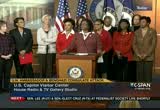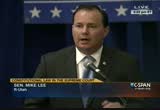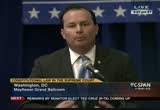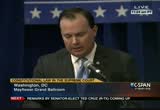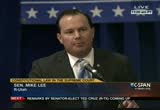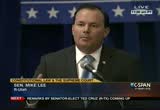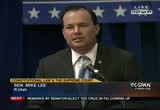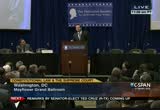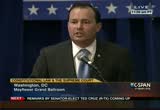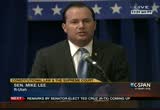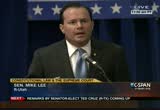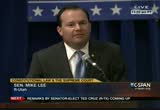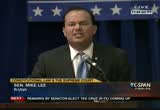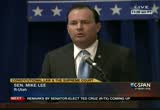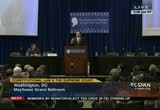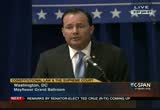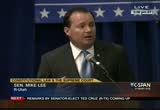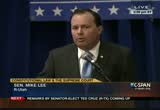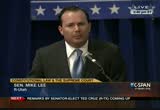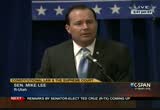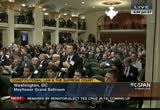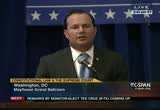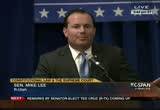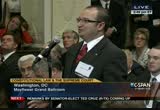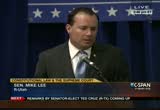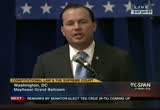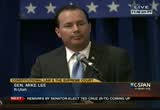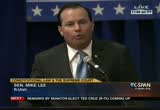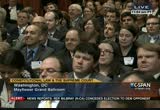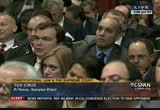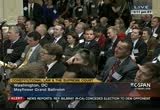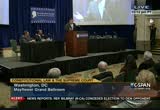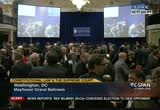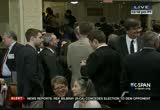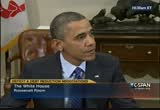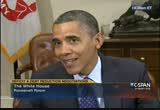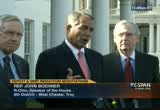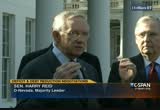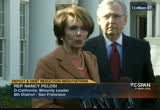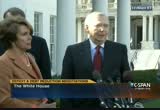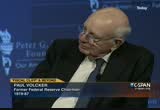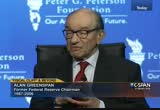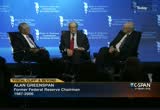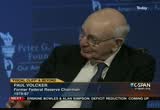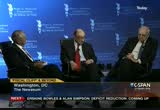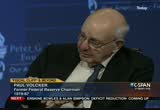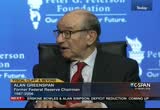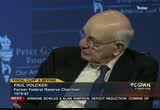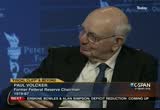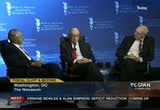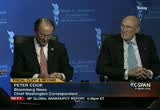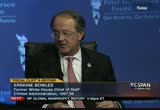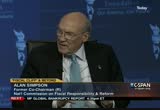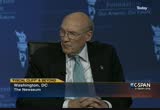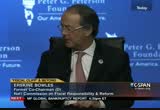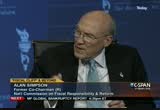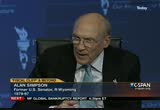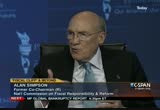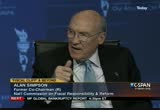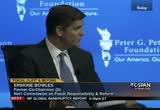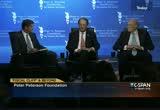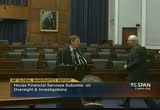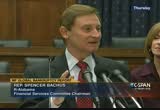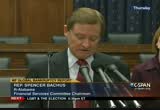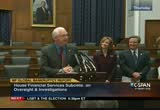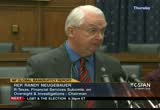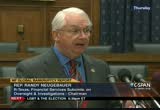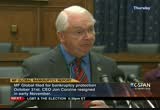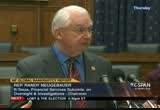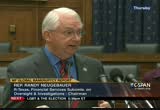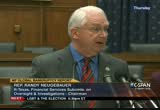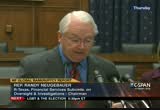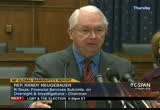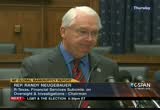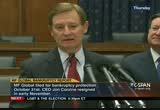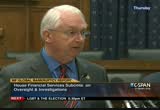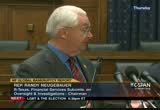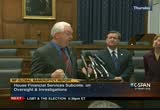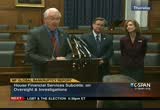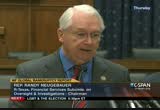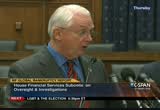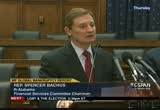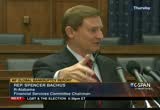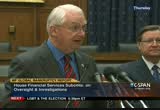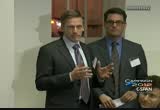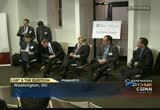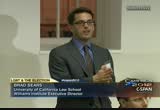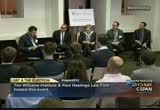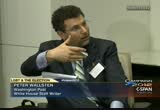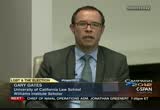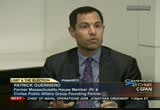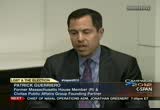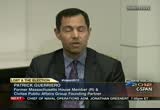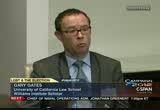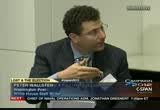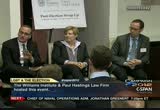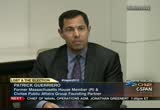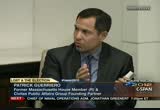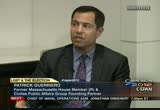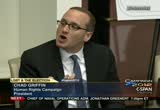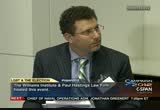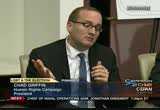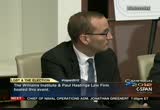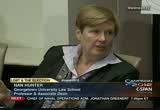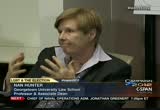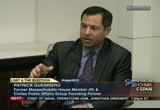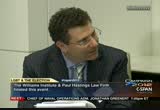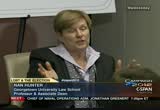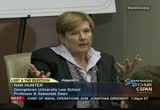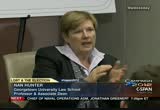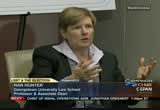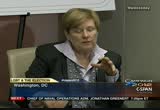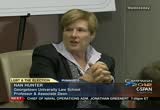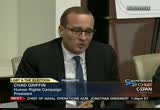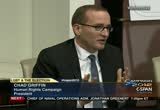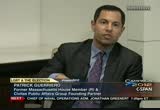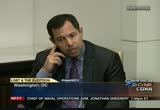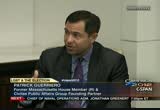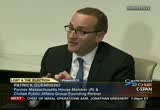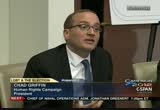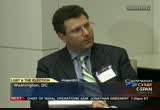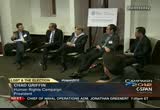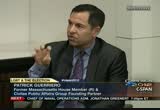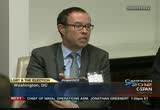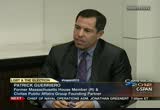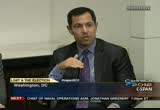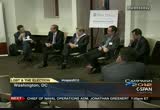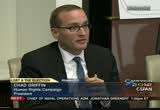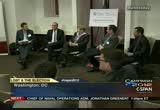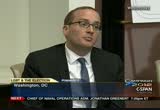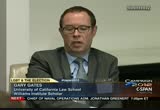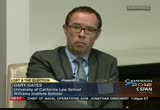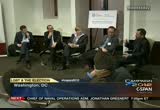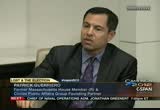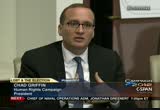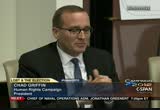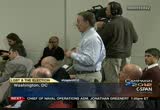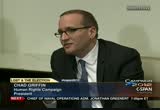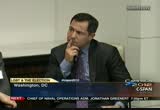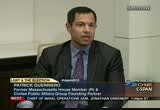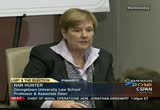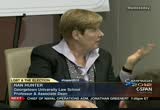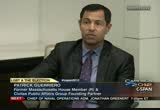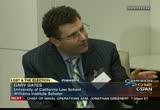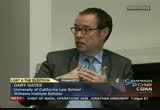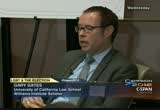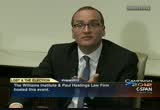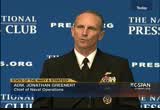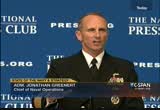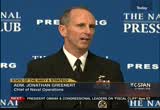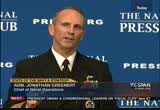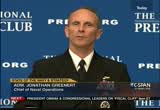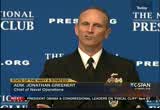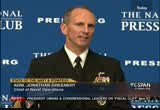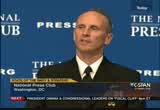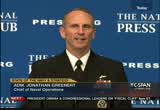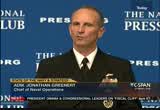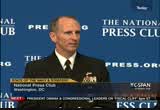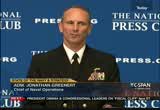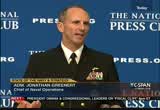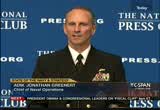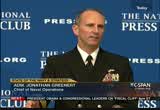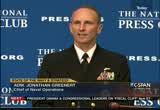tv Politics Public Policy Today CSPAN November 16, 2012 2:00pm-8:00pm EST
2:00 pm
iraq and afghanistan. somebody else's did. you're not angry at them. it is a shame that any time something goes wrong, they pick on women and minorities. i have an issue with that. i am probably not the most educated person in this house. but i am close. >> but i'm close. and i would say to you that these people really don't understand what it is we do here. we are here to represent the people of the united states, to move this country forward, not to tear down. we are not here to make life difficult for people who work hard to do the job that this country has entrusted them to do. so for you who are haters as young people. your hate is going nowhere.
2:01 pm
but look in the mirror and hate yourself, not the people who are doing this work. >> it is the job of these senators to question policy but attacks are -- that's what you do instead of dealing with the policy issues. we have have a very distinguished member with us, a good friend of all of us, someone who deals seriously with policy issues and is joined us today and that would be january from illinois. >> also i think today of most significance i believe is my role on the intelligence committee. all of us were given a briefing based on emerging information from the intelligence committee
2:02 pm
. susan rice, i do -- susan rice went on television based on the information that was available at the time and the briefing that she was given information and intelligence that she had no part in collecting. the kind of statement that is anyone who had been given those briefings would have made in public. obviously, this was on an unclassified buys sis but she was given information that she had that has subsequently been updated. it was not wrong or deliberately misleading in any way. there had been the belief that there had been a protest that developed into this attack.
2:03 pm
so susan rice as the president very clearly said, if anyone has a problem with the intelligence, they should take it up with the intelligence community and the president himself. he said come to me. and so to besmurg her incredible career and her stat chure and the words that came out of her mouth is completely inappropriate. and by the way inconsequential al. that is i've asked the question would anything had been different if the intelligence had been completely accurate at the beginning? would there have been different actions taken in what turned out to be a tragic situation with the loss of the ambassador and other americans and the answer is absolutely no. so i'm a bit confused about the whole deal about this benghazi
2:04 pm
situation other than we all agree it was a tragedy that we had the loss of life. but it's interesting to me that we aren't discussing another rice who went before all of the sunday talk shows some years ago whose statements about false intelligence were based on more information than that held by susan rice about this situation. and talking about if we don't go into iraq now, then the next we'll here from sa dam had you sane is in the form of a mushroom cloud that really did move to us consequential actions, 44'6" u.s. soldiers killed in iraq not to mention the other loss of life that
2:05 pm
occurred there. that really made a difference. and i would say that if you live in a glass house, don't throw stones. and there is no worthy reason to throw any stone at susan rice. >> very profound if you live in a glass house cast no stones. we've been joined by laura richardson from california. thank you for joining us here. this very unqualified woman of course spear headed efforts to bring the international sanctions against i ran, sanctions on -- iran, sanctions on north korea and has brought significant to bringing down kadafi. we now are going to hear from a
2:06 pm
very special colleague, terri sule from the seventh district of alabama. she has very special insight into the qualifications and integrity of susan rice. thank you for joining us. >> good morning. today i stand with my colleagues, proudly stand with my colleagues in expressing our outrage about the unfair attacks against the u.s. ambassador susan rice. these recent attacks are nothing short of offensive. nothing short of offensive. leading the charge to oppose ambassador rice are our senators who profess to want to block any potential nomination of this overly qualified public serve ant. and i for you cannot sit back
2:07 pm
like all of us and not say this is wrong. it's not only wrong, it's actually unpatriot i can. to be clear, the attack on the american embassy in benghazi in which four lives were lost deserves to be investigated and the full weight of the american government should be used to finding and bringing the real cull patriots to justice. but to suggest that ambassador rice would knowingly and purpose sli mid lead the american people is not true. this should not be for political and personal gain. i am outraged that these republicans could even suggest that this administration and that this chief diplomat would be come police to us in this tragedy. it's offensive and unpatriot
2:08 pm
tick. he acted in good faith in reporting what she had been told by intelligence. she said quote based on the best judgment at the time. senator mccain's comments that ambassador rice is unqualified and not very bright is woefully untrue. with all due respect, senator mccain, i know susan rice. i have known her for 25 years. we were graduate students together at oxford and i can tell you without the glare of washington politics that susan rice is a brilliant scholar, a renound expert in her field, a woman of unquestionable judgment and tireless efforts to fight and be a servant on behalf of the american people. she has the character and the
2:09 pm
where with all if our president so chooses we could not have asked and would not ask for a better secretary of state than susan rice. not only is she a brilliant scholar, the first african-american value dick attorney in at the theater school in washington d.c. a road scholar, has won awords for her research in africa and foreign policy. she has an emp rare career in the nation's service and one we should not sit by and let be tarnished. is she is a wonderful public servant but she is a woman of character and a person i am proud to call my friend and more proud to call my u.n. ambassador and would be even more proud to call her my secretary of state. so let us be clear it is unfair and i think unpatriot tick to
2:10 pm
assume that the chief diplomat would woefully, purposefully mislead the american public. to be come police to us in this tragedy at all is offensive. i think we need to get back to the nation's business and finding the real cull patriots who took the lives of the four americans. we need to leave the full weight of the american government to find those cull patriots and leave ambassador rice alone to do her job. let's get back to the work of the american people. >> as you can see there is a great deal of passion on this issue and to close us out it's going to be a good friend and colleague of ours from california who herself has had years of distinguished leadership in the california assembly as the speaker. mad dam speaker.
2:11 pm
and really understands leadership abilities and what they are. it's very difficult to recruit qualified women and senator mccain should know that. it is very difficult to find qualified women to do this work and when we find qualified women, we should not preemptively because the president hasn't even indicated he would nominate her. he has many choices. we should not preemptively destroy the chances of women to serve us in this country. so i am introducing a woman who has distinguished herself. she's a member from california and serves on the foreign affairs committee and is formally the speaker of the house of representatives from california karen bass. >> good morning everyone. i am very proud to be here. today is a day that i feel
2:12 pm
great pride of being a member of congress and standing up here with these distinguished women all of whom have so many accomplishments and we've heard so much today about the career and history of susan rice. so i stand with great pride with my colleagues. we all know what the real deal is. we knew what this story was before the election. it was about trying to undermine the election of president obama. after the election i think the real deal is our republican colleagues are disoriented and are in a tail spin since the election. they want to shoot, they don't know who to shoot or where the target should be so right now the target is on the back of susan rice. this has been very clear. i think you heard from my colleagues today specifically why there is no basis to the notion that ambassador rice would deliberately mislead the american public.
2:13 pm
you have to ask yourself what could she possible gain from doing this. what the republicans are accusing her of is completely inconsistent with her 20 plus year history as a diplomat. all of her accomplishments both academic and professional. i'm afraid my republican colleagues are trying to build a narrative in an attempt to derail a potential appointment to the state department, and an appoint. i might add that hasn't been proposed yet. we know over the last two years the number one goal of the republicans was to prevent the president from being re-elected. they failed t. message from the voters was for us to work together. we should be dealing with the fiscal issues facing our nation. we should be getting to the bottom of what happened in benghazi and what we need to do to protect the over 300 diplomats serving our nation around the world. and congress needs to make sure
2:14 pm
the state department has the resources to protect our diplomats. ironically my same republican colleagues wanted to cut money from the budget that could have been used to protect diplomats and now they're concerned about this. our first order of business should be to prevent a fiscal crisis. if one occurs it will be because of our inaction. a fiscal crisis could take place. in january president obama will be sworn in again. the message from the voters is for us to work together. my republican colleagues over the holidays need to do some soul searching and ask themselves do they plan to spend the next four years chasing ghosts in an attempt now to derail his presidency? they should stop trying to smear and incredible academic and professional record. i'm waiting for donald trump now to ask for her transcripts.
2:15 pm
we have to stop disrespected ambassador rice with the false implication that she deliberately misled the public. we will not stand for this nonsense any longer and negotiate will the american public. thank you very much. >> that's our message and we'll take any questions but again we want them to take that back. take back those words smearing her incredible accomplishments, the not so bright in particular, untrustworthy, how dear them. thank you. -- how dare them. >> yes, ma'am. >> you said that any time or one of you said any time something goes wrong they pick
2:16 pm
on a woman and a minority can you elaborate on that. do you feel there is a degree of sexism and racism in their comments 1234 >> there is no question about it. all of the things that they have disliked about thanges have gone on in this administration, they have never called a male unqualified, not bright, not trustworthy. i don't recall that ever happening. they didn't even say that about general petraeus they are all up in arms about. so there is a clear in my opinion sexism and racism that goes with these comments being made by senator mccain and others and i strongly stand by that statement. >> yes, ma'am. >> even if she's not necessarily at fault for the information she was given, do you think the negative
2:17 pm
reactions of some make her too radio active to have a viable shot at making it through the nomination process? >> i think they're trying to pre-empt that discussion but the reality is if you look at her record and her accomplish lts and her contributions to this nation, anybody who looks at that record and has a fair discussion with her would come one different conclusions. >> with all of the statement that is senator mccain has made, very negative ones about this administration and about susan rice, do you think he's not qualified to be a senator? >> yes, sir. >> if susan rice wasn't the
2:18 pm
only one that spoke about this, the president spoke about it and others spoke about it. if president obama did in fact mislead the country on this, what do you think congress should do about it? >> that is a speculation. we don't know. we are all trying to find out what the facts are. and senator mccain doesn't know what happened. i think that what we are dealing with right at this moment is a signal from senator mccain that they are not going to cooperate with the second administration of barack obama, that they are going to stall out all of his nominations. this is their warning shot that they are going to filibuster her appointment and perhaps anybody else's. i think that's what it is. and here is the intelligence committee member. >> again, i'm really confused.
2:19 pm
the only point in contention really is whether or not this attack emerged from a protest and as soon as the information became clearer and it did take some time for that to happen, then that was perfectly clarified. there is absolutely -- it's inconceivable to me for anybody to speculate there would be a deliberate misleading of the american people. why would there be? it's perfectly inconsequential al. there was a spontaneous demonstration and the terrorist groups organize niced to take tunistic advantage of it or not. in any case, there is no advantage to mislead the american people in that regard. i mean you have to have
2:20 pm
motivation behind it and there is none. and as soon as the intelligence became clearer and as a member of the committee, i was told exactly that, that there was this tchon administration and there were actually 12 different sources that thought that was true and that it came out that it actually wasn't and so we were briefed on it. but you have to have a reason for thinking that there would be a misleading and there isn't one. [inaudible] >> we were told that it appeared to be elements of terrorist organizations i think that the document, the unclassified document which the house intelligence committee asked for used the word extremist which the analyst
2:21 pm
believe is synonymous. >> we'll take you live next to the fed list meeting. mike lee one of the speakers at a discussion looking at the future of u.s. constitutional law and the supreme court. he's just been introduced and live here on c-span. >> i was very pleased when he was elected. i met him just a couple of years ago just after my election and just before he announced his candidacy. i especially look forward to no longer being the newest member of the senate. it's been a rough transition. the security staff is finally recognizing me as a senator. i no longer get carded. i'm from utah. i'm not used to getting carded. you laugh bit happened a lot when i first got there. they would look at me like what are you doing.
2:22 pm
these guys are heavily armed and i can't argue with them. and i would produce my i.d. and it's a card saying united states senator representing utah expiration 2017. i don't know whether that's when i personally expire or -- [laughter] but we went through this sha raid so often when i had to go vote. i discovered a short cut to it. this lapel pin was given to me after i was sworn in. i came to call it my sorry senator pin. when i got carded i would point to it and they would say sorry senator, come on in. it works most of the time. not all the time. one time i was on the floor of the senatened i had one hand resting on a desk and one of the non-uniform security
2:23 pm
staffers said will you please not lean on the senators desk. i thought it was weird that he didn't say don't lean on your desk. i said i'm terribly sorry it won't happen again. and he said are you with the minority? i said what do you mean on this vote or the next. i don't always vote with my party. >> he said do you -- of course i support mitch mcconnell he's our leader. are you part of the minority leader staff and i realized he doesn't get it so i pointed to the pin. blank stare and at that point i said i'm senator lee. what? my name is mike lee, i represent a state called utah. it resemiles a chair.
2:24 pm
it's square. he finally got it at that point he said i'm terribly sorry my name is steve if you want to report me and he ran for the door. i felt bad for steve. i like steve. i chased after him to make sure he knew no hard feelings. so every time i see him in the hall i say high so he knows there are no hard feelings. although it did occur to me, his name is probably not steve. [laughter] so when i started this year, 2010 i was looking forward to two things, two steps that i believed would help us fundamentally transform our government into that kind of government or something more cleesly representing or resemithaling kind of government that our founding father's envisioned for us. one of those events i knew
2:25 pm
would occur in june, probable toward the end of june probable the last thursday in june chi quickly identified as june 28. the other date that i recognize as potentially transform ma tive of our government, the other date that i recognize that i thought would probably have a positive impact on the development of our constitutional system of government was november 6. and i would just like to say at the out set that i want to thank chief justice roberts for preparing me john june 28 for the disappointment i would feel on november 6. i approached the court that day with a lot of anticipation. i had read all the breefs in that case and sat through four days of oral argument in that case. i had watched every movement, every eye twitch, every response to every question, every facial expression and i had listened closely to all the
2:26 pm
questions that they had asked. i thought i knew what the answer was going to be. a lot of it was wishful thinking. but i approached the courtroom that day with a lot of anticipation and a lot of hopefulness. as i took my seat in the bar session of the supreme court that day. i look to my right and slightly behind me to the section of the courtroom where the law clerks sit. i remembered just a few years earlier when i served aze a law clerk and sat in those chairs and i remembered how much fun it was to watch the justices announce a decision that they had been working on. we knew the result before the rest of the audience did. it was fun to watch their reactions. then i looked to my right and to the front of me and i saw that podium where i've seen so many lawyers stand over the years. countless lawyers i've seen stand there ever since i started attending supreme court
2:27 pm
hearings at the age of ten. it was an odd habit i picked up as a child. many of those lawyers stood there shaking because they were so nervous. their shaking goot more severe when they got a question they didn't anticipate. other lawyers had stood there as calm as if they were discussing the weather with a friend. my dad had been in the latter category. i had seen him argue in that court many times. sometimes i thought he was too casual but he was good at what he did. i could here his voice resonating through the microphone as i thought back to the last time i saw him argue before that court in 1994 against john roberts. that was a good day. an interesting day which as these thoughts were racing through my head, sooner or later the clock struck 10:00 and at the appointed hour the gavel and clock operated almost as if in perfect unison.
2:28 pm
i herd the familiar pound of the gavel fold by the canation oh yay. god save the united states and this honorable court then these justice come from behind these red velvet draperies. i listened to them start to announce the decisions and true to form the court held the most interesting case for the last case. and so the emotion in the room had reached a certain point by the time it came time for the court to announce it's ruling in n.f.i.b., i along with most of the conservatives of the room when chief justice roberts started announcing the opinion. i was even more elated as he launched into the
2:29 pm
constitutional analysis. i was elated for the third time in the last 75 years the supreme court was identifying something, anything that was beyond congress's i mens power. the tension in the room was palpable. you had conserve i was the in the room crying hot tears of joy you had lib rals in the room crying for the opposite reason which and then out of the blue the winds shifted and went out of the sales on conservatives and into the sales of the lib rals as the chief justice conned to explain that even though congress lacked the power to tell individual americans that they have to buy health insurance, not any kind but that kind of health insurance that congress in its wisdom seems necessary for every american to purchase that that power could be exercised under the taxing clause. this was a shocker.
2:30 pm
it was a shocker in part because the chief justice in his hand down announcement within the court left something out. he left out a piece of the puzzle that i didn't get to see until after i left the courtroom. the piece of the puzzle was that the court simetainsly concluded that the penalty attached to the individual mandate was not a tax. but the court then counter intuitively went on to hold it is a tax for constitutional purposes. the justice dealt with this in about one paragraph as i recall well a tax for some purposes might not be a tax for other purposes and that's the way it crumbles. you might have a not a tax for stat toir purposes congress gets to decide that but congress doesn't get to decide whether it's a tax for constitutional purposes. he never explained why the standard was more rigid on one
2:31 pm
side than the other. or why the court should be so willing to expand congress's power. it went on and continued to be a roller coaster ride. he continued to taunt and then torture conservatives by moving on to the next step of the analysis to the medicaid expansion provisions. explaining to us that for the first time in its history the court identified something that congress had done that violated the anti-coercion principle of the constitution. that they had coerced the states and that was not tolerable. conservatives were body up only to have the wind taken out of their sales yet again. with the court's very novel construction and remedy, a remedy that said yes, this is unconstitutional but we're going to order the government not to do that which the
2:32 pm
statute empowers the government to do. in order to the affordable care act specifically said the secretary may withdraw the existing federal medicaid stream from the states that refuse to expand their medicaid programs along the lines comp plated by the affordable care act. it gave this power to the secretary. but that which congress give eth the chief justice take eth away with the stroke of a pen. so what we saw that day was something very interesting. i struggled as i left the courtroom that day and talked to reporters who gathered to get reactions from members of congress who had reviewed the decision. i heard myself very quickly expressing a degree of optimism and enthusiasm or this decision. after all the court drew a line in the sand. after all they actually used the anti-coercion principle to
2:33 pm
declare something unconstitutional. but no sooner had those words left my mouth. no sooner had i expressed that thought that i realized it was a pure i can victory or a limited purpose victory. ained don't mean to discount the fact that it was a good thing. that due to the efforts of great lawyers, we did get a limited purpose victory. but my point today is we can't over look what we lost that day. we lost something very very important. what we last that day was the right that we have as americans to live in a society in which our national government operates according to this separation of power principles that is embedded in the constitution. now this separation of powers is important because we can't have a court making laws. that law is entrusted only to our elected congress and yet
2:34 pm
that's exactly what had happened that day. the supreme court rewrote the affordable care act twice. first in deciding that that which is a penalty and that which according to nearly assentries worth of precedent was a penalty because of the fact that it imposed a financial exaction as a result of a failure to comply with a firm ma tive command of the law was somehow a tax. that required a rewrite of the statute. that required and amendment of the statute. not just any rewrite or amendment. but the kind of amendment that congress itself had been unable to achieve support to enact. i found it very significant that congress had in fact tried to pass the individual mandate as a tax provision, tried to enforce it with a tax. they failed to achieve the necessary votes. why? for reasons that we all understand. it's really difficult to get a new tax passed in congress.
2:35 pm
that's what happened here. they couldn't get the votes. they couldn't get it passed. but it didn't matter at the end of the day because the chief justice rewrote it and turned a penalty into a tax. but it got worse than that when he rewrote it yet again to erase power that the statute grant ted to the secretary of humanened health services. with so we lost the opportunity to have our laws written by those of our own choosing, by men and women who stand accountable every two years in the case of representatives and six years in the case of senators. we can't over look this fact. there are two kinds of restraints we face in your system. the one con traint we're more inclined to focus on as lawyers is the judicial con traint. if congress does something that
2:36 pm
is repugnant to the constitution then the court is supposed to serve as a check. the court can't serve that function if at the end of the day its unwilling to exercise that power. and so the judicial check was removed in this case. the court faced with constitutional defects over came those defects by rewriting the statute. but it did so in a way that makes matters worse by virtue of the fact it got rid of the second kind of check, the political check. because after this ruling, it's no longer a deaf nell if you can't get legislation passed in a manner that is constitutional don't worry about it because the court will rewrite it so the court will take care of the judicial back stub and political back stub as well. it's not okay. this will further facilitate the erosion of another of the
2:37 pm
constitution's most important principles, that of federalism. the notion that government is limited and powers are few and defined and those of the states are numerous and indefinite. so this is not something we can embrace and accept as freedom loving americans, certainly not as conservatives. this is not something i think we should praise. i want to make clear i have no but respect for chief justice roberts. i think he's a good and decent man and for the most part he's been outstanding jurist throughout the course of his career. but this was a sharp abboar ration from that professional standard he had early in his career. i hope and i expect this will prove to be just that and it will not be something that we can expect more of in the future. you see because otherwise, if this is something we can expect more of in the future, then we
2:38 pm
will have found ourselves not only not benefiting from any limitations established by the n.f.i.b. versus very decision, we'll find ourselves with a bigger and bigger government, one facing more and more burdens as a result of its own inability to fund its own operations. ultimately the rule of law requires more than that. now when we look back at the reaction that some in our community had to that decision, there were some who immediately praised it, there were some even self-professed conservatives who immediately said this was a brilliant decision. this was a master minded decision because he preserved the institutional credibility of the court. he preserved his power as the chief justice to look out for the court's own institutional interest. he showed he wasn't partisan or
2:39 pm
taking one side or the other and he was going to chart his own middle ground and cut it down the middle. this isn't a good justification even though a lot of self-professed conservatives claimed it to be such. it isn't one because jurist take an oath to decide each case objectively on the basis of the law and the facts before them. and they'll decide that case regardless of how they think the public might treekt it. so looking out for the institutional credibility of the court, to the extent that means the public's opinion of the court is not only not a good jus fy indication for altering your judicial analysis it's an evil within the system. it's not something we can respect. to the extent that this was just an idea of let's split the decision so that it is even handed because that's fair. the chief justice i don't think
2:40 pm
believes that that is a good thing. i don't think any of us think that's a good thing. we have to remember that in what became sol mon's most famous case, his purpose was never to apply the law in the fashion that he prescribed. he was on a fact finding mission. his only objective in suggesting they split the baby was not to split the baby, the law didn't require it or wouldn't allow it. and had he under taken that effort negotiate party would have gone home happy. what he did was uncover the truth cht it was never intended to result in the splitting of the baby. unfortunately in this case what iv we were left with was an attempt i believe by a court that was determined to give each side some of what it wanted. but sometimes when jurist attempt to do that and consider that an end unto itself a lot
2:41 pm
of harm results just as harm would have resulted in sol mon's most famous case. we have before us a number of challenges as a nation. i think those challenges can be made easier or more difficult as a result of our willingness and our ability to communicate the reasons why it's so important that we live under a government that recognizes some resfraints on its own power. that we recognize each branch of government has its own power and it shouldn't step on any other branch's power. and we've got to stand up for the principle that not every power should be exercised at the national level. the more we stand for these principles, as popular as they may be, i tend to believe that our best days really will be ahead of us as americans. you see americans are smart. americans are able to recognize truth. truth resonates with the
2:42 pm
american people. but in order for it to resonate, it has to come from us. we have to speak it, we have to identify it and we have to identify error where we see error. this is one instance where error has occurred and i hope we won't ever shrink of the task of identifying error when it arices when it general dices our great constitutional system. thank you very much. [applause] >> two questions maybe.
2:43 pm
>> good afternoon. thank you so much. this is the third time i've heard you speak and you're inspiring every time. if you go back and look at chief justice robert's confirmation hearings he was asked about his theory of restraint and deaf rans. he was never asked to ar few cue late his theory of limited government. is there something they could do to the kind of blind restraint we got in the obama care decision? >> yes. this is something i bring up regularly in my short almost two years in the senate we of course have yet to process any supreme court nominees but we process with some regular arty lower court judges. and it doesn't matter whether they are district judges or circuit judges i make a practice of asking them what
2:44 pm
their views are on the enem rated powers doctrine and i will ask them to identify even if it requires some degree of speculation what if anything false outside of congress's power under the commerce clause and i make it more difficult for them by telling them that they can't identify lopez or more son and now i'll add to that n.f.i.b. as the basis of their theory. you find it interesting to see some of the responses. a lot of them look at me if i've insulted their mother or something like that. a lot of them look at me if i've asked them to derive pie to the 800th decimal from
2:45 pm
memory but it's an important question. i also think it's interesting to watch what happens when that question is asked at the supreme court. i thought it was interesting to watch variations of that question be asked during the n.f.i.b. arguments and to listen to this general hem and haw and ultimately not come up with anything that is beyond congress's power. >> you were perhaps most forceful in your response to president obama's recent appointments of three individuals to -- i was wondering if there are any assurances that will not repeat and two will there be a similar
2:46 pm
response from you or your colleagues or both of you should senator reid decide to proceed and change the filibuster rule? >> first as to the recess appointments issue. this was an important issue for me. when president obama made four appointments that he identified as recess appointments on january 4, 201, three to the n.r.b. and one being richard to head the consumer financial protection bureau. he wrote with precedent, people from both parties had been fond of responding to this by saying every president or nearly every president has made recess appointments the other party all the complains, get over it. grow up. but those who say that over
2:47 pm
look something important. as far as i've been able to as tine through my research it's the first time in history when any president has exercised the recess appointment power at a time when the senate was not in recess. it's significant in fact that just 24 hours before these appointments were made on january 3, 2012, the senate had held its opening queening session of session two of the 112 congress. congresses consist of two sessions, session one being the first year, session two being the second year. so the session had just queened the second session 4 hours earlier. and according to the senate's own rules and precedent and tradition, we were not adjourned for purposes relevant to the recess appointments clause. and so that's why i signal my
2:48 pm
displeasure at this. i had to think of something in order to keep it in the news because i think it's important for people to talk about it. i voted no on a number of judicial appointments since then, after that point. toward the end of the year, i lifted my no vote policy only because the senate republican conference had by that point in my opinion adequately responded to what the president did by invoking the rule refusing to process additional judicial nominees within a certain category beyond that point. so i regarded that as a sufficient response. i said at the out set until my party responds or get assurance from the president will won't happen again i'm going to continue to vote no. as to the second part of your question, if hair reid under takes this very nuclear option
2:49 pm
of tinkering with the filibuster rule, if as we anticipate he tries to shut down the process of cloture votes on motions to proceed, we will regard that as a threat to the institution and a threat to our system of rules, a threat to our system that has made the senate supposedly the greatest deliberative legislative body in the world and there will be a sprong response. i can't tell you exactly what that will be yet because in part we don't know what form hair reid's efforts might -- hairy reeds efforts might be but rest assured we're not going to take kindly to that. [applause] . >> this is wonder which to have
2:50 pm
you here again and that say can you believe teach this afternoon and i have the privilege of introducing our next speaker u.s. senator elect ted cruise from texas. it was two years ago when ted cruise came up to me and ooze in the room and said he was continue plating a run for the u.s. senate and asked for reaction. tryinging hard not to pour water over ted's commitment to public service i utered what would roll off of most of our tongs when a friend asks us for advice, are you crazy, do you have a fever, have you sought professional behavior for this deviant behavior. i asked all the usual questions sit the right time politically. do you think the money is there? is your family prepared for this? have you checked all the necessary boxes back home in
2:51 pm
texas? now as any of you who know ted would guess he responded to those questions looking reflective and discerning but you knew just below the surface that he was optimistic and raring to go. he wanted to do this from his experiences with the bush campaign and his bid for attorney general, he knew he was ready for the political fray and while he was not sure whether the timing was right electorally he knew from his experience as sliss ter general in texas as official in washington during the bush administration and as a former law clerk that it was important to get to the business of trying to defend our system of limited constitutional government in the halls of washington sooner rather than later. by the end of the conversation how could i be anything but thankful that he wanted to run and hopeful for success.
2:52 pm
ted's drive, optimism and pursuit of public service paid ouf with great ackry fice from him and his family, ted stands before us as the senator elect from the state of texas. and we are all the better for it because we have in the senate a goodman with exprordnare skill and intellect and with unparalleled commitment to our constitution and small limited government. i have no doubt, no doubt that ted will quickly emerge as one of congress's key spokesman and leaders for revival for the constitution standing alongside of course senator mike lee. extend a warm welcome to a long time federal fed ra list senator elect ted crews of texas [applause]
2:53 pm
>> thank you very much. thank you. well thank you for that very warm welcome. it is great to be back with family. like many people in this room i've grown up with the fed list sote. this has been my home for my entire adult life, my entire professional life. we're having our 30th an versi now. i first became involved with this group 20 years ago when i was in law school. at the time i have to admit 20 years ago the society had already seen this established major power which probably reflects the nigh evty of a want al.
2:54 pm
but it is truly breath taking how we have journeyed together. the first thing i have to say to everyone here, there are a lot of men and women in this room who believed in this crazy improbable journey when no one in their right mind would have, who expressed the same forbarnse leonard discussed although i have to admit the are you crazy was implied. but he is far too diplomatic to have said that out loud. i have to tell you two years ago i sat in this room and listened to brand new senator mike lee stand and give a speech that was just jaw dropping. let me be clear there is no united states senator in the u.s. senate remotely like mike
2:55 pm
lee. [applause] and i'll tell you afterwards he and i went and visited -- it was actually the first time we met and we spent the next couple of hours debating constitutional law. when you just get elected and you're a brand new senator elect they give you a little office in the basement of the capitol that is buried in the bowls there. i can tell you i'm pretty sure i saw minute wandering around outside. but i spent a couple of hours with mike walking around. i remember it was this friday because it was the day his committee assignment requests were due so i walked with him to hand in his request for committees. and i remember run of the things we were talking about at the time was the national debt which was at the time $14
2:56 pm
trillion. a few trillion ago. and it so happened the g.a.o. had just come out with a report that estimated the value of all of the land owned by the united states government was right at $14 trillion. now that struck me as a fairly convenient equivalence and i don't see any reason why the united states government should be the largest landowner in the world and why it should own much of the united states west of the mississippi. so we began discussing that and it occurred to me that in mike lee i was in the presence of a fellow traveller. in the presence of a fellow fed raist. he was the first major figure to endorse my campaign right when we launched and he was --
2:57 pm
it was just a month or two later we were visiting and talking about the senate and he said well what could i do to help and i said well, you could endorse me. and he said yes, i could do that. and he looked at his staff and said i can do that, can't i? and they looked at their shoes and didn't want to argue with their boss too much and said i guess you can. and so he jumped out and endorsed me when he hadn't been in the senate 30 days. one of the first acts and it significance any fide mike lee was not going to be a typical senator. when we started this campaign, when a lot of y'all jumped on board, when we started i was quite literally at 2% in the polls and the margin of error was 3%. [laughter] which if my math
2:58 pm
serves me means tech nick cli i could have been at negative 1%. it might have been the case that 1% of texans would have gone to the polls and written in not cruise. and we went through a $50 million primary. most expensive primary in the entire country. i can tell you you have not lived until you have had $35 million in nasty attack ads run against you. midway through my wife turned to me and said goodness gracious, i didn't realize you were such a rot ten guy. we were out spent three to one. in any other race i should have been road kill. i should have been an ar ma dill la by the side of the
2:59 pm
freeway. for those of you who aren't texans you can go home and look it up. we saw something extraordinary happen, we saw thousands of people all over the state of texas come together and begin knocking on doors, begin making phone calls and reaching out to their friends and we ended up going from 2% in the polls to not just winning that primary but winning by 14 points. it was an incredible testament to the grass roots, to the way politics should be decided. now the main message i want to convey to folks today is a combination of retrospective and prospective. retrospective asking what happened last tuesday on the election because the election wasn't pretty.
3:00 pm
and prospecive asking where to conservatives go moving forward and i think those two questions are closely intertwind. and i'm going to cut >> and i'm going to the punch line. what the federalist society has done has been extraordinary. gene meyer and i were just visiting right beforehand and gene kind of laughed and said, you know, when you and i visited, you said we were going to run two years ago, gene said i foolishly thought you could win. i laughed and i said, you know, gene that is a sign of our collective naivete. you know what, three decades ago when the federalist society was founded, the missions of this organization will impossible to achieve. it took a bunch of any way eve
3:01 pm
idealists, oblivious to the realities of conventional wisdom to do what we did to the law. what i'm going to suggest to you is collectively we need to do to politics what we have done to the law. where has the federalist society gone in three decades? three decades ago it was a very different legal world. this organization, you know, last night, gene was talking about the law schools, the schools that are trying to shut down federalist society groups from even bringing in speakers. why? because we're winning the arguments. our ideas are right. go back and read a statutory interpretation case from the 1970's. they begin with, we have before us the statutory question, the
3:02 pm
legislative history is as follows. therefore, go back and read -- you can't even, many of those decisions you can't even find the statutory text in the opinion. maybe it's a footnote if you're interested in knowing what statute we're talking about, here it is, look it up. far more relative is the subcommittee report and one member of congress sat on the subway on the way to get a cup of coffee. organizism didn't exist. what did this organization do collectively? we started making the arguments. we started making the arguments that law matters, that we have a constitution. that the constitutional protections matter. read any statutory interpretation decision today. everybody starts with a text. they don't always follow it. for some it is the thing to be
3:03 pm
gotten around, but at least they're acknowledging it's the thing to be gotten around. go look at a decision like d.c. versus heller. now, i think that was a tremendous victory for second amendment rights. it's very bad organizism, but what a statement of victory. in the words of parisians, we're august originalists now. that is a sign in the legal world that we have won many of these arguments. it's not to say that these fights are not still happening, but the legal world is transformed because of the men and women in this world taking a principaled focus at winning the argument. my view in the political world, this is an organization that
3:04 pm
reveres the constitution. i would guess if i asked the people in this room, how many of you would like to be a federal judge. half the hands would go up. but that constitution, look, the federal judiciary is incredibly important. it's of course in article iii of the constitution. there is a reason the framers began with article i and article two. and the courts and the political branches are inextricably intertwined. we may well see the consequence of this last election on our judiciary the next four years in a way that i think is highly pearlous. -- perilous. the press after any election in which republicans don't do well, it always writes the headline, the problem was those pesky conservatives. that was written before the
3:05 pm
election day was over. if only republicans would become like democrats, they would have won this election. in my view, the election results on tuesday have one simple explanation, we didn't win the argument. heck, we didn't even make the argument. our country was built on foundational revolutionary ideas. you think of the founding fathers who fought a revolution, first with bayonets -- [laughter] [applause] >> for the record, there are more bayonets in the military than there were in 1960. [applause] >> then and even more important
3:06 pm
revolution, a revolution of ideas. for me lenia, we were told that our rights came from monarches and given by kings and queens and what we would enjoy were crumbs given by the rulers. the framers of our constitution invested that entire concept of sovereignty. they began from the proposition that our rights don't come from a king or queen or the president. they come from god almighty. the constitution exists to protect those rights and to limit government, to serve as jefferson put it, as chains to bind the mischief of government. for my lenia, there have been two ways of ordering a society, based on free markets and entrepreneurship and that has
3:07 pm
led to the greatest opportunity and prosperity ever seen across the globe. the other way is based on collectivism, government control and socialism. and that has consistently time and time again led the shared suffering and misery. it is not accidental in the debates over obama care that not a single democrat publicly pointed to any of the nations on earth that currently have socialized medicine and said that's what we want because the effect over and over again of putting it in practice, getting off the ivory tower has not been pretty, has been ragsing, has been poor quality, has been government bureaucrats getting between us and our doctors. but we didn't make that argument. let me ask you, what was the high point of this presidential campaign?
3:08 pm
without exception, the first debate between romney and obama. it's the one time we actually contested ideas, presented two viewpoints and directions for the one. and ininvestablely there are the mandarins in politics who give the voice, don't rock the boat. by the third debate, i'm pretty certain that mitt romney actually french kissed barack obama that night. [laughter] >> and there say focus group somewhere of undecided ohio voters who lived in a cave for the last 30 years who decided they liked that.
3:09 pm
don't show any disagreement whatever with the president, don't rock the boat. just be a nice guy and have a personality contest because those turn out so well for us. our ideas work. our ideas don't work. even that first debate, i mean how striking was when mitt romney actually pressed obama his response was, well, under bill clinton there was great economic prosperity. the whole answer of obama is about bill clinton and now nifty the economy was under him. i got to tell you i would have given a limb to see mitt romney turn to the president and say, mr. president, i knew bill clinton. [laughter] our ideas work, their ideas
3:10 pm
don't. the last four years our economy has grown 1.5% a year. that is less than half the historical average. for 70 years, we have averaged 3.3% growth a year. now, this president is fond of saying he inherited the worst economy in the history of the universe. [laughter] >> and everything by the way, is george w bush's fault. he doesn't have much historical memory when he makes that argument. any of all remember 1978, 1979, double-digit unemployment, 22% interest rates, gas lines, stagflation. in 1980, a very, very different president got elected. ronald reagan like barack obama inherited a struggling economy. and reagan implemented policies 180 degrees opposite those of obama.
3:11 pm
instead of jacking up taxes, he slashed taxes. instead of exploding spending and the debt, he restrained the growth of spending and instead of unleashing the hounds of regulators, by the way, when i think of regulators, i can't help thinking of mr. burns saying "release the hounds!" [laughter] >> instead of releasing the hounds of regulators on small businesses and entrepreneurs, reagan limited regulation and the result was one of the most extraordinary bursts of economic productivity our nation has ever seen. the fourth year of reagan's presidency was 1984, the same as the fourth year of obama's presidency. anyone know what g.d.p. growth was in 1984, 7.2%. our ideas work. their ideas don't.
3:12 pm
if you want growth, if you want jobs. if you want the 23 million people struggling to find work to get jobs, the answer is simple. you need growth and to get growth, you got to reduce and simplify the tax burden, reduce regulations and unchain small businesses and entrepreneurs. it speaks volumes that over 50% of americans who voted on election day believed the economy was george wx bush's -- w bush's fault. there is a reason for that. obama said that once every day and twice on sundays and we never responded. republicans were so afraid of uttering the words "george w. bush," that we never responded. let me give you another example. you all are familiar with the quote "war on women." the president, every democrat
3:13 pm
went throughout this campaign saying republicans want to take away contraceptives. what utter and complete nonsense. i don't know a single republican on the face of the globe who wants to take away anybody's contraceptives. look, my wife and i have two little girls. i'm thrilled we don't have 17. [laughter] >> not nearly as thrilled as she is. [laughter] >> this attack was always deliberate mendacity. by wait, we got the foreshadowing of it. remember way back when in the republican primary when george stephanopoulos was moderating. why on earth are george
3:14 pm
stephanopoulos moderating republican primaries? [cheers and applause] >> but if you remember, stephanopoulos asked mitt romney, what is your view on right to contraceptives? that wasn't an accident. i guarantee you that was the democratic attack, we're going to say it's a war on women. everyone scratched their head and said what are you talking about? nobody was talking about contraceptives until they decided to cook up this attack. what the issue was really about , it wasn't too long ago that the democratic party was proud to have been the first major party to have nominated the first two catholics to be president of the united states. what do you think of al smith or a john f. kennedy would have said to a president who says to the catholic church, change your religious beliefs or i will use my power as president to shut down your hospitals and
3:15 pm
your charities. that is a radical view. that is an extreme view. it's never had anything to do with contraceptives which everybody has a right to get and nobody disagrees with that. this was always about government forcing americans to violate their religious conscience. and yet despite having an administration that took such a radical view, the president got 50% of the catholic vote, got 71% of hispanics, the vast majority are catholics, did we even once make the argument in the catholic community. we didn't make the argument, and if you don't make the argument, you don't win the argument. now, going forward, my focus in the u.s. senate unfortunately are in the minority are going to be working to cut spending,
3:16 pm
to push regulatory reform and tax reform to get economic growth back. and when i ask each of you to do is bring the same creativity, the same diligence, the same thinking and passion that each of you individually have brought to changing our legal world, bring to the political discourse. if you want to change where we are, we have to win the argument. as margaret thatcher famously put it, first you win the argument and then you win the election. i look forward to working with each of you to do precisely that, thank you. [applause]
3:17 pm
3:18 pm
>> just a reminder if you missed either of the federalist society speeches by senator mike lee of utah and senator elected cruz of texas, you'll find them shortly in our video library at c-span.org. >> was vice president for literally 82 days, truman. he actually presided over the senate. nowadays the vice president doesn't bother with that unless his order is needed to break a tie. he said that was my job. truman never learned anything with f.d.r. or his staff. the transition with zero knowledge. that doesn't happen anymore. got a phone call from the white
3:19 pm
house, get to the phone right away. so he picked up the phone and at the other end, they said, get to the white house as soon as you can. so he grabbed his hat and dashed out. and he had a car, of course. they gave him a chauffeur when he became the vice president. he went to the white house and taken to the second floor which was the family floor and was met by eleanor roosevelt. he looked up and she said, harry, the president is dead. he was in total shock and he said, what can i do for you? and she said, harry, what can we do for you? you're in trouble now. >> from his early life through his presidency, aida donald looks at the life of harry truman in "citizen soldier" sunday night at 8:00 in
3:20 pm
c-span's q & a. >> for the last nearly half century, the discussion of the assassination has been dominated by two schools of thought, or, if you will, to faiths. i'm going to very briefly describe each of them and how they approach the evidence in the case. to begin with, there is the church of the lone assassin whose add herians insists that both oswald and ruby were essential lone nuts who murdered john kennedy and lee harvey oswald for their own personal reasons. on the other hand, we have the church of the grand conspiracy. they're adherence is vague as to exactly what did happen and who is responsible, but they're absolutely convinced that there was a very large conspiracy, usually involving figures within the u.s. government and a massive cover-up. >> this weekend on c-span 3's american history tv, 49 years later, the questions remain, lone gunman, the mob, c.i.a.,
3:21 pm
castro, the military industrial complex? what happened in dallas? the assassination of john f. kennedy, sunday at 7:30 p.m. eastern and pacific. >> democratic and republican congressional leaders are voicing optimism about avoiding tax increases and automatic spending cuts in january, the so-called fiscal cliff. leaders from both the house and senate met with president obama this morning at the white house, their first discussion in negotiation on the fiscal cliff. the president started the day with comments to reporters. >> i want to welcome the congressional leadership here and thank them for their time. i think we're all aware that we have some urgent business to do and we got to make sure that
3:22 pm
taxes don't go up on middle class families, that our economy will remain strong, that we're creating jobs and that is an agenda that democrats and republicans and independents, people all across the country share. so our challenge is to make sure that we are able to cooperate together, work together, find some common ground, make some tough compromises, build some consensus to do the people's business and what folks are looking for and i think all of us agree on this is action. they want to see that we are focused on them, not focused on our politics here in washington. so my hope is that this is going to be the beginning of a fruitful process where we're able to come to an agreement that will reduce our deficit in a balanced way, that we will deal with some of the long-term impediments to growth and we're also going to be focusing on
3:23 pm
making sure that no class is able to get ahead. i want to thank the leadership for coming. with that, we're going to get to work. thank you very much, everybody. appreciate it. excuse me, there is actually one other point that i want to make and that is that my understanding is tomorrow is the birthday. for those who want to wish him a happy birthday, we're not going to embarrass him with a cake because we didn't know how many candles were needed -- >> yeah, right. >> but we do want to wish him a happy birthday. >> thank you. >> thank you, everybody. appreciate it. >> good morning, everyone. we had a very constructive meeting with the president to
3:24 pm
talk about america's fiscal problem. i outlined a framework that deals with reforming our tax code and reforming our spending. i believe that the framework that i have outlined in our meeting today is consistent with the president's call for a fair and balanced approach. to show our seriousness, we have put revenue on the table as long it's accompanied by significant spending cuts. while we're going to continue to have revenue on the table, it's going to be incumbent for my colleagues to show the american people that we're serious about cutting spending and solving our fiscal dilemma. i believe that we can do this and avert the fiscal cliff that is right in front of us today. harry. >> this isn't the first time
3:25 pm
that we have dealt with these issues. we feel we understand what the problem is and we felt very -- i feel very good about what we were able to talk about in there. we have the cornerstones of being able to work something out. we both have to give up some of the things that we know are a problem and so it's like when we arrive at a point where we all know something has to be done, there is no more let's do it some other time. we're going to do it now. i think we feel very comfortable with each other and this isn't something we're going to wait until the last day of december to get it done. we have a plan. we're going to move forward on it and we're going to work during the thanksgiving recess. we're going to meet with the president when we come back the first week, at least that's as i understand it. i think it was a very constructive meeting. i feel very good about what we were able to talk about.
3:26 pm
>> it was a very constructive meeting. we had a recognition that every person in america knows that we must reach agreement. we had, the speaker spoke about a framework going into next year. i was focusing on how we send a message of confidence to consumers, to the markets in the short run, too. that is to say that we should have a goal in terms of how much deficit reduction. we should have a deadline before christmas. we should show some milestones of success so that confidence can build as we reach our solution because if we do not reach agreement, not only will we miss the opportunity for doing something good for our economy and lifting the spirits and the confidence in our country, we will have an economic downturn that must be avoided.
3:27 pm
we understand our responsibility there. we understand that it has to be about cuts. it has to be about revenue. it has to be about growth. it has to be about the future. so as we cut investments and as we talk about revenue, we have to do so in a way that promotes growth and supports the future. it was good. i feel confident that a solution may be in sight. mitch. >> i can only echo the observation of the other leaders that it was a constructive meeting. we all understand where we are. i can say on the part of my members that we fully understand that you can't save the country until you have entitlement programs that fit the demographics of the changing america in the coming years. we're prepared to put revenue on the table provided we fix the real problem, even though most of my members, i think
3:28 pm
without exception believe we're in the dilemma we're in because we don't tax too little, we spend too much. i had a chance to talk to the president yesterday about his trip to burma, a country that i have had a long-standing interest in over the last 20 years. i want to commend him for going. i think it's an important step for him to take. thank you. >> thanks, everybody. [captioning performed by national captioning institute] [captions copyright national cable satellite corp. 2012] >> and back on capitol hill, results from the election continue to trickle in. representative brian bilbray has conceded his san diego area district handing democrats with another pickup with two interparty races to be determined, this report from the "washington post." he conceded to scott peters, the democrat who is currently san diego port commissioner.
3:29 pm
on capitol hill in the house today, the house had one bill on the agenda, the bill that would normalize u.s. trade relations with russia and that passed by a vote of 365-43. the senate has yet to take up their version of the measure. a capitol hill reporter fills in the details. >> sports of this bill normalizing trade relations with russia are saying it's long overdue and good for the nation's economy. why is that? >> well, it >> it will hopefully double exports to russia from the united states. it will go across a broad group of products. manufacturers are backing it strongly. it could be airplanes and parts associated with that. locomotives, chemicals, food,
3:30 pm
clothing. it seems russia likes u.s. products. we expect there to be good and quick growth. >> how is lining up to oppose it? >> it has wide support on capitol hill. even the administration backs the bill. it does seem to have broad support across washington and the country for businesses that want to export products to russia. >> with all of the legislation and that remains to be done in the lame-duck session, this is the first one. what are the prospects in the senate? >> the prospects look good. there will be a couple of issues they will have to work out. the house has attached a human rights bill narrowly focused on violations in russia.
3:31 pm
the senate has similar legislation, but it is broader. it would deal with human rights violations worldwide. that is sponsored by senator ben cardin. it is stock when the bill goes to the senate, the senate might decide to add language that makes the bill apply to global human-rights violations. the senator said he is not sure how that will pan out. but he definitely wants the bill done by the end of the session that would be a force -- be before christmas. >> what will they sign when the president sees it? >> it sounds like most of the time, the administration has been against human-rights legislation being attached. there could be some backlash from russia. even the business groups have
3:32 pm
said russia must follow the rules of the world trade organization. the administration has said they backed the provisions to normalize trade regulations. it seems like they might have to sign a measure that includes human rights legislation because it has broad backing from congress. >> does president putin support the legislation? >> i think he wants the u.s. to have normal trade relations -- rushed to have normal trade relations with the united states. he does want to get the trading line on track and get past some of the cold war era rules that were put on russia in 1974. i have not heard him say much. he is probably not happy about the human rights legislation. but there is much broader growth
3:33 pm
of people trying to work on human rights initiatives in russia. that will probably grow. i am sure he will be happy to have the u.s. engaged with the rest of this country. >> you can read her work at thehill.com. >> the russian trade bill passed the house. the house also passed a resolution this afternoon that supports israel's right to self- defense. members approved the resolution but a voice vote with no debate. the house is back on tuesday, november 27, live coverage on c- span. >> the miami book fair is live this weekend with two days of nonfiction books, your calls, e-
3:34 pm
mails, and tweets. the panel will include his widow. our live coverage starts on saturday at 10:00 eastern. tsin us online for the cha on facebook. >> for the last half century, the discussion of the assassination has been dominated by two schools of thought. i will briefly describe each of them and how they approached the evidence in the case. to begin with, there is the church of the lone assassin which insists both oswald and ruby were lone nuts who murdered
3:35 pm
for their own reasons. on the other side, we have the church of the grand conspiracy. they are frequently made about what they think did happen and who was responsible. but they are convinced there was a large conspiracy, usually involving figures in the u.s. government, and a massive cover- up. >> this weekend, 49 years later, questions remain. what happened in dallas? the assassination of john f. kennedy on sunday at 7:30 eastern and pacific. >> the peterson foundation hosted a conference today looking at the so-called the school cliff, tax increases and spending cuts set to take place in january. former fed chairman alan greenspan will be joined by paul volcker. we will also show you a portion
3:36 pm
from the chairs of the simpson- bowles commission. together, these are about one hour. >> major economic events in your careers. what would be the impact on the economy if we go over the cliff? what if policymakers kicke the can down the road for several months but failed to address the gap between revenues and spending policies and fail to stabilize the long term debt? >> i think may be too much is made over the cliff business. we will not solve the long-range problem in the next seven weeks. it will take some time. we have to deal with the short run problem. we have the big sequester and
3:37 pm
tax increase. that has to be dealt with in terms of the immediate economy. i think that can be done. that will take some action on taxes and spending. it will not be the action that cures the longer-term problem. that will take some time. it will take some time to redesign the tax system and put restraints on spending that will deal with the deficit over the years ahead. >> year, dr. greenspan? >> i agree with paul. there are two separate issues. we have to recognize how we solve the short-term issue will affect how we address the longer-term. my main concern is we do not
3:38 pm
recognize how difficult the problem is going to be. we have essentially picked all the low hanging fruit of the fiscal system. we have stretched ourselves beyond comprehension. the basic problem is fundamentally the issue of spending. we have had a significant rise in so-called government social benefits. it is going up at a tremendous rate. the irony of this is it went up even faster during the prudent years of republican administrations, more so than the spendthrift democrats. this is a bipartisan problem. i think we have got to stop it. we have to stop it clearly.
3:39 pm
the real difficulty is dollar for dollar, it is eroding the savings of society. savings is the fundamental input for capital investment. capital investment is the primary ingredient for productivity. growth and productivity have slowed down. our growth rate has slowed down. until we solve the short-term problem to get on to the longer- term problem, we will find the markets will respond very negatively. the fundamental concern is we have to realize where we're going cannot continue indefinitely because it is eating into the productivity and growth rate of the economy. if we do not have that, how do we finance our benefit programs?
3:40 pm
you can write entitlements as long as you want. where are the physical resources going to come from to meet them? i think this is a critical issue. taking it down the road will not help. the markets may respond negatively before we even notice it. that will cause a huge problem. >> i think in the case of europe, you can take any of the countries you wish, the action taken happened suddenly it seemed to me and surprisingly. do you have any sense of how much time the markets will give us before they react in a strong way? >> the and one thing about
3:41 pm
markets is they do not give you advance notice. if they could give new advance notice, the problems would be arbitraged away. by definition, a crisis coming from markets does not give you advance notice. we have to recognize that fact and not say we will deal with this when the crisis arises. that is late in the game. >> what do you say about that? >> i agree. you will not know when it happens. it is impossible to forecast or plan different things. you will have a crisis at some point. how do you deal with that? you cannot cure it overnight. that is for sure. spending is the crux of the problem. there is a lot of the built-in. it will take years to get back
3:42 pm
to get back in relation to gdp to something sustainable. how do you create the program now that is convincing? you are talking about 2013 or 2014. you have a convincing program that will get to the right place in 2020. it will take that long to get back to a balanced budget. we will not have the crisis or we will minimize the chance of a crisis if people are convinced you are on the path to deal with it. i think that is the political problem that exists at the moment. how do you convince the american public and the world that the united states is on a sustainable path?
3:43 pm
>> one of the questions i asked when i expressed the concerns you are expressing his where else will they put their money? that is the question i get asked by people when i express these concerns. where else are the lenders willing to put the money but the united states? the united states versus other countries. in no other countries will people put a lot of money in, so whether you worried about? that is true currently, but we cannot count on that forever. china is going to be different in a few years. japan may have some recovery. europe, we hope, gets out of its problems. we cannot say we will deal with this problem later because everyone else is worse off than we are. that is not consistent with the
3:44 pm
kind of leaders of the united states needs an economic and political affairs. we cannot simply accept the argument that other people are worse off than we are. >> we have had a great blessing of a reserve currency. let's talk about how permanent the arrangement is. it is very convenient. it has enabled us to finance deficits easily at low interest rates. we have to finance the balance of payments. karl marx is not a prominent figure anymore. once in awhile, he said things that were sensible. he said if you give countries enough rope to hang themselves -- look at the southern tier of europe.
3:45 pm
they could borrow easily until it stopped. borrowing indefinitely easily is a good recipe for a first-class crisis. >> this issue of where they will put their money, there are two fundamental problems. one is the assets can evaporate. wealth is two doctors. it is in come wealth is two factors. it is income and future income. it gives you the value of the assets you really have to invest. there is a simple solution. what will happen is the discount doctors will arise -- discount factors will rise. there is a structure of of the
3:46 pm
things people can do. they can take their money and put in goods. as a currency, there is gold. the notion they cannot put it anyplace is nonsense. investors can and will do it in the wrong places for the wrong reasons. wherever they may do, it is not good. -- whatever they may do, it is not good. >> paul, do you want to add anything to that? he raised an interesting question. how do we give credibility we're going to do something this time when the problems we are describing are very complex? whether it is reforming the tax system or entitlements or whatever. do you have any ideas? >> if i had the answer, i would
3:47 pm
tell you. i would not keep a secret. it is a difficult problem when you are talking about something that has to take place over years. you do one of two things. you have a target which is accepted generally by the president, congress. one way of expressing it is the way simpson-bowles did. what percent of the gdp will you a map for expenditures and use that for the spending programs, entitlements, defense, a civilian? the sense of commitment the best you can. it is hard to put it into law. you cannot predict what will happen several years down the road. do we have a consensus we want to get spending that is running
3:48 pm
as high as 25% of gdp? can we get it back to 20%? it is tough. is 22% a reasonable goal? that is one way of going about it. the other way is setting a numerical target for spending and taxation. on the tax side, it is easier. you can change the tax law. you cannot change, i do not think you can have a lot to contain -- control spending for 10 years. >> there is an interesting issue in policy. it is extremely difficult to resend -- rescind entitlements to which people think they are legally entitled. as you are doing that, you are
3:49 pm
abrogating contracts of some form. there are all sorts of constituencies under every entitlement programs which support it. the issue is taxes can always go up and down. there are not the same political pressures there. i think the issue is fundamentally spending. if we have to pay a high price in raising taxes temporarily in order to get spending down, i think that is a good deal. i do not think you can continuously keep this deficit open. if you raise taxes, we will turn the economy down. if the cost of getting out from under the problem is a moderate recession, i would say it is a cheap price. somehow thinking we will get through this thing without pain
3:50 pm
is nonsense. this is a very dangerous situation. it is not a question of whether we pay a large painful price for a small painful price. the question is which is the least worst of alternatives. if we have to pay a large price in increasing taxes to get the extraordinary unstoppable ris in spending, we have to do that. then recognize it is politically easier to lower taxes than lower spending. >> let me take back a bit of what i said before. there are some areas you can work on. social security is less a part of the entitlement problem, but is a problem. i think is solvable by means that have been much discussed.
3:51 pm
when you put that in place, you have something that will last for years. theoretically, he can do something about medicare. i do not understand enough about medicare to give suggestions. the entitlement program, you can redesign. defense spending, civilian spending depending on year by year appropriations is more difficult. put in place and say there is for 10 years. >> as i have listened to various schools of thought, it seems there are at least three. one is the short-term problem is so. mary -- so primary that we have to get around to stimulating the economy short-term and let the
3:52 pm
long term take care of itself later. alan, i heard you say getting the long term situation under control is so central that you are willing to take steps that may retard the economy short term. then there is another school of thought that says you can do both in the following way. you can lay out a plan for the long term that will create confidence you are going to do something, but it does not get put into effect until the economy has recovered. what school of thought do each of the fallen to? maybe there is a fourth? >> i do not think the markets defined solving the short-term
3:53 pm
problem. we promise to pass legislation. let us now to the short term. they will start to laugh. the form of laughter is the markets are going to run into serious problems. we have got to stop. this is a problem. we are in a democratic society. in a democratic society, we all have our own ideas. but compromise is not an abrogation of principle. it is a recognition we choose, in order to maintain the fundamental structure of our society, to compromise. we used to do that all the time. the stress between the parties is no greater now than it has ever been. you go back and look at the distribution of the caucuses in
3:54 pm
the house and senate. they all look precisely like they did with the conservatives and liberals 50 or 100 years ago. the problem is, unlike what we used to do 20 years ago, people used to speak to each other across the aisle and talk to each other and come to an agreement. it was never a difficult problem. now i do not think they do. until that starts at a level that gives majority votes, i think this will be very tough. >> i take it there are people who say it is so difficult to get people to talk to one another that you have to create a crisis, which is the only thing that will get them talking to each other.
3:55 pm
in medicine, there is the phrase that disease is caused by the doctor. i do not know what that strategy leads to. but what do you think of that point of view? >> i do not disagree with it. is that what you are saying? >> you, paul? >> we may create a crisis like the current crisis over the cliff, the political crisis. >> why do we have a debt ceiling? we have an appropriations process that creates the spending level. we have a tax code. if you are even remotely adroit in arithmetic, you can figure out what the president and congress have passed and what
3:56 pm
the debt of to be. now you come in with a new -- it goes back to the liberty funding act of world war i. originally, the congress had to pass legislation for every issuance of debt. they speeded up the process by putting in a debt ceiling and substituting. we have still got it. i do not get it, frankly. >> if you were a congressman, if you would elect to have the trigger to talk about it every once in awhile. >> why do they not spend time doing something about it? >> to go back to the earlier question, given the state of the
3:57 pm
economy, it will take some time to get consensus. it will not be january 2013. it is going to be 2014, 2015 before that gets put in place. it is not easy to change the tax thing where you say to get rid of some deductions and loopholes. they are there because people want them there. we ought to get rid of a lot of them. there is a big debate as to which ones to get rid of and how. to think you will resolve it in two weeks or six weeks is foolish. >> you mentioned taxes. one of the biggest debates going on is what to do about taxes on those above $250,000. one of my roles is to try to
3:58 pm
present various sides of the debate. there is a school of thought that it is the over $250,000 that are so-called job creators. if you increase taxes on those, you will have a significant effect on the economy. this is part of a larger question of how serious the effect is on the economy of raising taxes. let's start with a narrow question. suppose taxes were increased for those above $250,000, but not the rest. what would you guess the effects would be? >> zero. >> that is a nice, clear number. >> i do not quite agree. we can decide the issue of the
3:59 pm
political notions of who should get taxed. there is no question the vast proportion of personal savings which is the bigger part of gross domestic savings in the economy are in the upper income groups. to the extent you increase taxes on them, you are essentially reducing savings. the data are clear on this. savings are a necessary condition for capital investment and productivity growth. leaving aside the argument as to what extent the issue affects the economy directly through the so-called job creation, i do not look at it as a job creation issue. that is a secondary effect.
4:00 pm
i look at it as a problem -- there is one remarkable stability in the economy in the last 40 years. it isit is the sum of government social benefits to persons, and a gross domestic savings on the economy as the other. gether, havehem to du ranged from 26% to 20% of gdp going back to the mid 1960's, and what you see is dollar for dollar, it has the increase and benefits rises, savings go down, and this fundamentally affects the long-term outlook.
4:01 pm
if you for example project the issue of savings continuing as a stable proportion of the gdp, which it had ben from, say, 1983 back, and you look at the actual decline that is going on in savings, and you can attribute roughly to the spending rise, and that is the reason we have got to stop this extraordinary uncontrollable rise in spending. it is affecting our long-term growth, and the irony is, without the long-term growth, as i said before, you will not have the resources to make the benefits that are being created by the congress, which are paper benefits. they do not create anything. they just get a right to get this targeted.
4:02 pm
>> if i understand your answers, paul would say if has zero effects. i am sure you would want to elaborate. >> i hear you saying why you do not like it. if it is part of a total package, that gets at the spending problems. you think it is a price worth paying. >> absolutely. >> i do not think changing that particular tax rate at this particular time will have a big effect on the economy. overall, there is a good argument for keeping tax rates as low as possible and lower than the level at which we are in. that takes a lot of consideration of the total tax system and how you organize it.
4:03 pm
i would aim ultimately for a balanced budget, and you want the game for a slower level of spending as you can get by with. i do not know exactly what that is, but it is a good deal lower than we have now. that is a fundamental problem, no question about it. then we have got to revise the tax system that will produce whatever it takes, 22% of gdp, and do that in the most efficient way be can, and i think the present tax system is pretty well broken. i'm not sure we can rely so much on the income tax as we have in the past. we ought to begin looking at more consumption-oriented taxes. >> i agree with this. it is a terribly important point, because remember what taxation is for. it is to find the spending which we appropriate. spending comes first, and did you decide how much you need to
4:04 pm
raise in taxes. this notion that we can somehow manage the fact that taxes and spending do not go together has been a failure. we have tried it for years, and you have been arguing against the deficit. the reason, as you may recall, the general ethos in the united states before i would say 1970's, or maybe even a little earlier than that, was the fact that the federal budget ought to be -- ought to have taxes equal to spending. i remember president eisenhower apologizing to the american people for very small deficits. got sophisticated with our macro economic models as how you can manipulate the economy by boosting fiscal policy. there is a terrible bias in the way the system works, which has
4:05 pm
led us to this fiscal cliff, which -- and without the debt ceiling. you have been railing against this, i regret to say, no interest whatsoever, but we have come down to the point where our very sophisticated economic policies have led us to this point, and i think the way paul put it is exactly right -- you decide what you need to do for spending and then you raise what ever is required to fund the fact. and stop with this business of we can do it, 3% deficit, because it does not change the level of debt to gdp. that is factually correct, but it is irrelevant because if you do that you will make -- you will not make that either, and that is what is happening. >> me shift a little bit to
4:06 pm
europe and try to help me understand this situation. first, what lessons does the european experience teach us, and second, there are a few indications that maybe europe is coming up with some possible answers to their problems. what happens -- i lot of the money has been flowing out of the euro, what are the chances that europeans might be getting their act yet there, and if they did, what effect would that have on us? >> do not think they are getting their act together. kicking the can down the road, what that is fundamentally doing is financing a very large part of the fiscal deficits of the 17 countries of the eurozone
4:07 pm
central bank money. you can look at the size of the european central bank balance sheet and last year if has gone up more than one trillion euros, funding is essentially the deficits of the individual countries by lending directly or essentially buying the bonds of the particular countries. there is no evidence that -- the creek situation is classic. i cannot imagine how the level of bevel -- debt increases ever are to be paid off. the problem ultimately is that the guarantors in northern europe of some of the extraordinary behavior of the
4:08 pm
southern europeans is running into problems in the north, and i do not think this is coming together. as i wrote in an article a year ago, i did an article in the "financial times," says a cultural problem, and i think the euro is it have great difficulty holding together. >> paul, do you want to add anything? >> i hope it holds together, but it is a difficult road to follow. the levels of unemployment they have and some of the southern european countries, but i think the big lesson here is you refer to earn a year, you have a situation where there was no restraint on greece and spain and italy and borrowing money cheaply partly because they were part of the eurozone and that failed provide the answers and they could borrow with the same industries as in germany. they borrowed and they got in
4:09 pm
trouble. they are small countries. the united states is a very big country, but we have some of that symptom, and we do not want to have the breakdown that they had in europe when they reached the limits that the markets would take on their borrowing. the real lesson for us here is fundamental lesson. , i want to wrap this up a little bit. i want the two of you to play god for a moment. >> just play? >> perhaps you are already in that state. we have outlined today's challenges, short term, long term, and so forth. if the president were to call you in the oval office and say, ok, all things considered, what should i do, what would you have him do? >> i would like paul to answer
4:10 pm
that one first. >> as to what to do with this untenable situation, that a sequester, they need to do a short-term deal, do the hard work, and deal with the tax system, and you got to look at social security, medicare, and what can you do that is convincing in terms of the other expenditures over a period of time? that is a very tough thing, but is there consensus on the broad level of spending that will -- that we are willing to pay for in taxes? , i am afraid that is more than 20%, which is what the historical relationship has been to gdp, but i do not know if it has to be much above that, but that is the question. >> alan? >> well, everyone is saying the
4:11 pm
right thing, so to speak. both the white house and congress. they have been saying the right thing for a long time, but nothing has happened. i basically say unless and until we literally decide that we are willing to forgo some of our privileges on both sides of the aisle, we can talk -- we can posture as much as we would like, but it will not make any difference. you have got to act. the markets -- let me say this -- on september 14 -- i am sorry -- a program shortly after the simpson-bowles was announced, i was asked -- barely understood that it had just come out --
4:12 pm
whether simpson-bowles would be usable by the congress, and i said that simpson-bowles is what will ultimately pass, and the only question is whether it is before or after a crisis. i still hold to that view. >> ok. i have raised a lot of questions. what should i have asked that i did not? >> you are always comprehensive. [laughter] >> is that what this conference is all about? >> i would be thrilled if that were the case. all right, please dithanks these two. [applause] very well done.
4:13 pm
you know how much of their lives they have put into this effort, and you two guys are heroes and patriots, and there is no way we can thank you enough. so thank you. [laughter] >> to all of us who are involved in this effort, we stand on the shoulders of peter peterson. if he did not pay the trail, we would have no effort to fix the debt or bring about a long-term fiscal responsibility and reform. i started with this marvelous man over 30 years ago, when he said we got to do something about the solvency of social security. i said, pete, am i to do that? he said not get off. and then we did the danforth- kerry thing. he wrote a beautiful book.
4:14 pm
here is a guy, persistence, loyalty, patriotism. he takes a lot of flack, but he is the prince. we are on witness protection. you are the prince. >> have chatted with you several times when the commission first started, when you released it, i could listen to you talk about these issues. i wanted to jump in and get your sense of where we are, because as we speak, the president is meeting with john berner, the first face-to-face talks, and in december of 2010, you plant -- you called norplant the moment of truth. two years later, what moment are we in as boehner enters? >> this is a magic moment, i really do. it is a moment when our generation has a chance to do something about this problem that we created. it is our generation that got us into this mess, and we ought to get ourselves out. we got a good chance.
4:15 pm
you got a second-term democrat president who has come out and said he is willing to put entitlements on the table. big deal. you've got a speaker, a republican speaker, who really gets at, who really understands the depths of the problems we face, and he has come out and said we are going to put revenues on the table. big move. he got at least half the members of the senate already saying they will support a balanced plan, which makes a lot of sense. we have got the business community lined up firmly against -- for doing something smart, and i guess most importantly, we got this fiscal cliff where if we go over it, we are going to face the most predictable economic crisis in history. fortunately for all of us, it is also the most of voidable. this is the magic moment to get
4:16 pm
something done. >> senator simpson, we never talk of compromise. there is still division here. >> it seems to me to have taken the word compromise up a step. three years ago the word was we do not know the word compromise. if you cannot learn to compromise an issue without compromising yourself, you should never be in any legislature and you should never marry. [laughter] the only troubling thing i see here really troubling is you have democrat leaders -- and do not forget the leaders have not helped us at all in any effect ive way. they listen to us and they tell that their position, but they have not been out there. what is disturbing to me is the word may be the democrats could gain if we do get off the cliff. that is out there, and then the
4:17 pm
republicans say they be we can gain if we go over the cliff. i think that is disastrous to even think in those terms. mr. erskine says that is like putting your country. i am not quite as warmed by it all, and a couple of years ago you board the guy who said we were going over the cliff, and i said, no. >> i think we can not be stupid enough to do it. we can resolve this problem now by making some very tough, but doable, compromises. if we go over this cliff and we do not reach a deal immediately thereafter, here is what will happen, and that is about a once last three possibility that we will go over the cliff and nothing will happen. what will happen is you will see moody's and fitch down great our
4:18 pm
credit. you will see a stock market that will say we never thought these guys would be stupid enough to do this. you will see a stock market that will really crash, and you will see businesses really slow back on hiring, they will flow back on their capital expenditures, investments. you will see consumer confidence go down and we will, be facing a mess, because what happens, the economic effects of going over this cliff, are enough to slow economic growth by about 3%. we are only growing at 1.5% today, so that is enough to put us back in recession. about 2 million people will lose their jobs and unemployment will go back to 9%. why would we do that when there are good alternatives that we can do bicycle compromises now during the lame-duck session? >> apple compromise is out there on the table.
4:19 pm
have things changed in the time that even simpson-balls is not the right answer now? >> there are certain things that have to be adapted, but what i out is there was chuckling. durbin and coburn have been tremendously an integral part of this. they really are superb men, and bright and patriotic, and of course the stereotyping is out there, and that hurts everything. they say is durbin part of your plan? oh, god, not him. they are not laughing now. this is like a stink bomb in a
4:20 pm
garden party. they do not like it. it is a curse, and the real estate guys and everybody on that list of people that gain tremendously from tax expenditures are out there with their fangs out right now. we knew this would come, but they never dreamed they would be talking about this plan, and now they are not just talking about it, they are talking about implementing parts of it, and they are in shock. you ain't seen nothing yet if you do not think the savagery in the next few weeks putting the heat on these guys in congress from everyone of those people are hard to lose when we dumped all the tax expenditures and gave the people of america what they needed, a tax code with a flat 8%, up to 70 grant, up to 2010, it is all there. it is all in a 64-page report, and it is still there and it is not going away. , our hope is during the lame
4:21 pm
duck you cannot rewrite the tax code in 48 days. for us, the american people should really be disappointed, why the rest of the country has been having what at best be described as a very fragile economic recovery, in washington all they have been having is an election. any business, if they were facing the equivalent of a $7.20 trillion in and it's got, and that is what we have over the next decade, that is what the economic effect of this will become the expiration of the bush tax cuts, the payroll tax, that patch that was put on the amt so it won't hit the middle class, the expiration of the unemployment benefits, the sequester, which was a mindless, senseless across the board cut
4:22 pm
came across because the failure of the supercommittee, and no business tries to balance their books doing it across the board. you do it surgically and tried to do things that have the least adverse effect on productivity. today we got 48 days left, and went to this election. isn't it amazing that during the election, at all four of the debates, the words "fiscal cliff" were not ever mentioned. no one -- >> no one mentioned the solvency of medicare. to think the debate took place and nobody ever got into that two big things that are driving this country. >> every day, every news organizations, say in 48 days, 47 days, and what is the senate doing? the senate went home. they are going to only work 20
4:23 pm
days trick of this was a business, all hands would be working and trying to resolve this issue. our best hope is to get some kind of framework deal that will call for $4 trillion worth of reduction over the next decade, but it has got to have real substance and real clarity for the markets to think it is real, it is going to have to have been significant down payment, it is going to have to have a real timeline, and it will have to have a fail-safe provision that is realistic, not one that somebody is going to try to walk away from like this curt sequester. i would say it has to have some flooding 67 votes in the senate to override it, so it will be hard for these guys to squirm out of it. >> you think that dividing lines have already taken place. if speaker boehner and the president continued to butt heads over the ideas of raising
4:24 pm
this tax rates for wealthier americans, extended the bush tax cuts, how do they reach the middle ground? >> tax rate for wealthier americans are going to go up. that is just a fact. that is going to happen. what we should be talking about is how can we do it where it has the least adverse effect on productivity here in this country, where it has the least adverse economic effects. whether you do it by rates or by reducing the spending and the tax code, you aren't have to do it. it could be a combination of one or the other. i will give you examples, you could check the value of tax expenditures at 20% and then measured them down to 0% for the most wealthy, and that would generate the same amount of revenue as raising the tax rates to 39 put 6%. you could put up this thousand
4:25 pm
dollars cap on tax expenditures. 91% of the money would come from people whom make more than a $250,000, and would the progress of, because most of the money would come from the top 81%. is very progressive. there are lots of way to skin a cat, but would be got to do is talk about it because they're plenty of options. the point is we will have to have some revenue, but you got to talk about cutting spending, because that is the biggest problem. we had about $1 trillion of revenue and $3 trillion of spending cuts. , remind us if you can about the medicare changes, the entitlement changes you talk about in your plan, and now republicans are saying have to be part of the conversation as they meet at the white house today. >> it is not just since and-ball andk yet domenici-rivlin,
4:26 pm
domenici and rivlin did a wonderful job. there's a lot of stuff to play with. no need for further hearings of any kind. i thought what was an interesting thing in the tax expenditures, 1% of the american people used 25% of those, and 20% of the american people used 80% of them. figure that baby out, and guess who is getting the end of the pie. 20% of the american people are getting 80% of those 180-plus babies cannot put in there by most of the skilled lobbyists, at the most appropriate time of social engineering, and only 27% of the american people, itemize, so it 3/4 of the american people never heard of that stuff. who is howling? home mortgage interest deduction, what is going happen
4:27 pm
to the housing industry? it will survive because we said take it. who is benefiting from a million bucks in home mortgage interest deduction -- deduction? we set take it to $500,000, and then get a 12.5% non refundable tax credit to everybody, which helps the little guy. if everybody would quit talking about the little guy, the little guy is the guy that is going to get the coast in this process if you do nothing. there is not any question about who is to get it. when the tipping point comes and they say you are dysfunctional and we want more money for our money, we know you are addicted, you have borrowed $16 trillion, so we know you want more. you borrowed $3.60 billion a day, and 41 cents every day on every but he spent. we are going to get your money, fleiss and an interest rates will go up, and guess who gets
4:28 pm
hammered put the middle class. the fakery. >> you have some groups, and you'd have heard complaints, including fox, a charitable community, very worried about what happens. how would you handle that? >> we tell them to read their report, which is a sick idea. everything failed, read this. it is 64 pages. it is in english. all these are sick things to look at, and you take a charitable about action, you put a limit on it, and give him a 12.5% non-refundable tax credit. we knew we would be savage and we know it is got to get much more intense because when we put this baby in, these groups that together and just laughed. they had a chuckle. ha-ha. it ain't funny anymore, and now they are really, really smoke. >> people in this town talk about the need to get rid of
4:29 pm
earmarks. year marks -- earmarks are $16 billion in the preparations bill, but compare that's to the air marks in the tax code. that is $1.10 trillion a year. that is what they are not talking about. we have to get serious. we have got about $2.30 trillion worth of revenue coming into the country. we're spending about $3.60 trillion. we got about a $1.30 trillion dollar deficit, and this goes on as far as the eye can see. we have got to grow up. america has got a real problem. if we do not change, and we just take the theory and stick our heads in the ground, it will not be long before all america will be able to do is take care of a couple of old coots like m e and al and by a few tanks.
4:30 pm
if you like education, if you think we should be investing in research, if you think we should be doing something about this $4 trillion of deferred maintenance we have on our highways and bridges, then we'd better grow up, and we better understand that we have got to make some cuts throughout this budget or we will not be able to invest in anything that america has to invest in to be competitive in the >> something has changed since december 2010 and that is the kind of support you're getting for -- from some in the business community. are you satisfied with the level of support and are those business leaders going far enough in offering specifics, what they are inmay have to fall by the wayside. >> i will say it again -- we will not be here if it was not for the peterson foundation.
4:31 pm
they laid the groundwork. we stand here on their shoulders, but they made it possible for us to have a voice in this matter because people were prepared to listen. thisl and i did help form fix the debt campaign. i hope everyone will go to our website, which is fixthedebt.org. we have over 300,000 people that have already signed a petition, trying to tell congress, please, get back to work, stay there, get a balanced plan, put our fiscal house in order. 's todayclose to 100 ceo who get it. they know if we go over this cliff and we do not get a deal that we are likely to go back
4:32 pm
into recession. they want some clarity. they want to be able to understand what their future tax rates are going to be. they want to be able to plan. right now capital is on strike. when capital is on strike, you are not going to create any jobs. that is why they are saying, wake up. we are prepared to make sacrifices. we are prepared to do our part, but we have also got to address the spending side of the equation to get rid of these debts. >> do not forget the extraordinary progress of dave cody. he said, "who are you people? is this the way you run your government?" he has tremendous. but the real escape hatch that i have noticed is people come up
4:33 pm
and say i am ready to do something if everybody else will because they know the escape hatch. >> you know what this reminds me of? i just finished 5 years as the president of the university of north carolina and there was a nobel prize-winning scientist and his nobel prize-winning project was running out of money, so he turned to his team and said we are running out of money and we have got to start thinking. that is what america is. we are running out of money and now we have got to start thinking. we have to make the hard political choices. if we do, we're going to be able to compete and win against any nation, but if we do not, we're going to stay on this path and become a second-rate power. my generation got us into this mess. we have got to get us out. we cannot wait to the next generation -- until the next generation.
4:34 pm
>> you have the president and john boehner in the room. what is the advice to give these two men as they begin these conversations? >> sit down, have a beer, quit joshing each other, quit listening to the babble from the right and the left, saying we're throwing the old lady off the cliff in the wheelchair -- [laughter] watering the earth in his white robes, telling people they raised taxes. that was a freudian thing there. what can grover do to you? he cannot murder you or birdhouse. the only thing he can do to you is to feed you for reelection or put some jerk in the primary and if that means more to you than the country, you should not even be in the dam congresn congress.
4:35 pm
[applause] >> your advice? >> compromise, do the right thing. now is the magic moment. it is our responsibility. >> i want to thank you both. we are out of time. the conversation is going to continue here at the summit. thank you again for joining us. thank you to the to what you. i appreciate your work as well. we will be right back in just a moment as we continue here at the fiscal summit. [applause] tomorrow, former senator marco rubio speaks at a fund-raiser for iowa governor terry branstad. it is his first trip to iowa since the 2012 election and has been mentioned as a potential presidential candidate in 2016. you can listen on c-span radio or watch online at c-span.org.
4:36 pm
in-house financial services subcommittee on oversight and investigations report released this week regarding the mf global collapse places much of the blame on and ceo john karrs 9. in a news conference on -- john corzine. an investigation revealed poor internal controls and a lack of raw record keeping. >> we learned of a double whammy facing our nation. the fha, the federal agency that insures many federal -- many homes, is running out of money for the first time in its history. they may need as much as 6-$12
4:37 pm
billion. thankfully, we did pass legislation earlier this year with important reforms to the flood insurance program and i wanted to announce that we stand ready to work with the administration and our democratic colleagues in congress to address these new challenges in these two important federal programs. when it comes to mf global we must keep in mind that this is really about people. it is the failure of a large corporation, but more than that, it affected millions of farmers and ranchers and farming communities throughout this country who lost their money and
4:38 pm
have suffered terribly. they were already struggling to begin with. there was already a drought, as many of you know, and this is compounded those woes. everyone here can understand when you suffer a loss of your income, it is just as devastating for you and your family. i want to read two letters that i received since the failure of mf global because you may have gotten the impression that "these people have or will get their money back." number one -- it is not at all certain that they will get all
4:39 pm
of their money back. but when you read that they may get their money back, you may have that false impression that they have not suffered a tremendous loss, and that could not be further from the truth. here is a letter from a farmer from minnesota. he said shortly after the october 30 first, 2011, bankruptcy filing, i was notified that my balance of $ 253,000 was not accessible. he goes on to explain that, as a result of this, "i sups and qusubsequently was forced to liquidate my crop in the tory. -- my crop inventory."
4:40 pm
the loss suffered by this farmer meant that his ability to finance his crops, make his mortgage payment, to pay for his farm equipment -- farmers go heavily in debt to plant their crops, to harvest them, they take risks with the weather, they take other risks with the farm prices fluctuating, but this is a risk that was needless and was avoidable. and $200,000 to a farm in minnesota -- in no way will he ever get that money back. he is never going to be made whole. here is a texas farber -- as i say, -- a texas farmer -- as i say, these are real people.
4:41 pm
when we talk about hundreds of thousands of farmers, ranchers, businesses in these communities -- here is a 74-year-old man, former, suffering from parkinson's disease. he already has that challenge. he has a son in school at university. he is helping finance that. his only income are the than from his farm operations is the social security. that is is to sources of income -- has two sources of income. he wrote me and says no one knows where my money is. at some point, he may get some of it back, but he has lost of crop, a year of income. it may be hard for us to identify with what has happened to these people because we get
4:42 pm
paid every two weeks, every week, maybe once a month in case of members of congress. they basically plant a crop and they get paid once or twice a year. imagine if you only got paid once a year and, suddenly, you were not paid for a year. how would you make your mortgage payment? how would you make your rent payment? college a major automobile payment? how would you feed your family? maybe in the year, they will get 80% of their money back, but what happens during that year? i would say to you please do not get the impression that these people will be made whole. i want to commend my
4:43 pm
subcommittee chairman ran dy. i have issued a prepared statement, which i released a few minutes ago on mf capital. in that, i thanked some of our members for their hard work. two of them are behind me. these were superstars in the freshman class. conseco from south texas and nan hayworth from, i guess we will call it the hudson river valley. both of them, as freshmen,
4:44 pm
actually pass significant reform legislation. men of the -- many of you know that man was valedictorian of her class. -- nan was valedictorian of her class. he lived the american dream. he operated a bank in texas. he has a banking background. they were loved by republicans and democrats together. nan was criticized for being a member of the tea party. believe you me, she may be many things -- to quote something we often hear now "nan is no tea partier candidate." she was a person that worked
4:45 pm
across the aisle. i told both of them their loss is america's loss. i know you who cover the hill sometimes find that the people who lose are often the people who would pull the country together, and i think that happened with bob dole and judy, two of our hardest working members. this election is not about numbers. it is about real people. this committee lost four of our most bipartisan across the members, and it was a blow. shortly after mf global declared
4:46 pm
bankruptcy, they launched a careful and comprehensive review of the facts. the subcommittee investigation involved three hearings, interviews with more than 50 would assist, and a review -- more than 50 witnesses, and a review of documents. these documents were obtained from mf global, its former employees, federal regulators, and other sources, including the farmers i mentioned earlier. and thousands of other people on main street. the subcommittee's their review of and that global -- review of mf global's collapsed is available online to view at the website. if you're listening over tv or
4:47 pm
listening in the press, go to the web site and take a look at this yourself and i think you will be somewhat horrified at what you see. before going any further, let me again say to tico and nan and mike fitzpatrick and others on the subcommittee and our staff, some of them are here today -- can you stand up? i guess they are already standing up. gizelle, i will let you recognize them. they provided a true public service. mf global was the eighth largest bankruptcy in our nation's history, but that is not what makes this failure noteworthy.
4:48 pm
companies of all sizes fail every day because of bad luck, bad timing, or bad management. what makes mf global's collapsed unprecedented is that more than $1 billion in customer money -- not their own money, but someone -- whenmoney wen missing. this marked the first time in history of the u.s. future industry that a customer suffered a loss due to the mishandling of customer funds by a clearing house or futures exchange. these customers deserve to know how and why their money when missing. the two letters i had -- these were people saying "what
4:49 pm
happened?" all americans deserve to know that regulators and policy- makers must be held accountable to prevent similar losses from ever occurring again. when financial reform was debated two years ago, republicans suggested consolidating a number of regulators, so that one regulator would be responsible when we had a failure like this. not several regulators all pointing their fingers at each other. instead, dodd-frank eliminated one regulator, kept all the others, and added three more. despite the promise of dodd- frank that regulators would work together, what the subcommittee investigation found was that there was no meaningful coordination among numerous federal regulators.
4:50 pm
all responsible for a piece of the pie. and responsible for the supervision. they were responsible for seeing that customer money was segregated and not lost 4 "misplaced." -- or "misplaced." misplaced really minimize this. if your salary was lost for year, i do not think you would call it misplaced. this left each regulator with an incomplete understanding of the country brigitte -- of the company's financial health. the customers pay the price, not the regulators, not mf global -- it was farmers, ranchers, and their rural community that suffered. when the writers looked at each
4:51 pm
other, did not know things, did not coordinate, this once again raises the question -- which we talked about two years ago -- whether regulators are so preoccupied writing hundreds of new rules that they are missing the basics like safeguarding funds and' protecting investors from financial fraud. you have more regulators than ever, but you have an an historic failure. once again, i think chairthe chairman and the staff for their outstanding work, and i also appreciate the media and the press. you cannot have a democracy without freedom of the press and freedom of speech, and you go to
4:52 pm
other countries where they do not have that -- i just got back from a country where -- that is very much in play, so let us all celebrate that we live in a country where we do have freedom of press and freedom of speech. thank you, members of the press and media for being here. >> good morning. i am from lubbock, texas. i am the chairman of the subcommittee. i appreciate his leadership and the contribution our fellow committee members have given. if you look at our committee, we have held a number of hearings and investigative a lot of different issues., at the same time, we have been working on this report.
4:53 pm
the question is what is this report. leading up toinline mf global's collapse. i guess we could name this report "the rise and fall of mf global." we had different subcommittee hearings where we had the senior executive officer of this company, and we had some of the regulators come. we have interviewed over 50 witnesses and look at over 247,000 pages of documents. then the question is what was the purpose of this study. it was to give us a history of what happened so that we could look in the future to make sure this does not happen again. this was the first time in the history of the industry that the
4:54 pm
customers' money went missing. i think this was an important part of the study, to find out money wenters' missing. secondly, where the regulatory failures that allowed this to happen. one of the things we put regulators in place to do is to ensure the full markets are transparent, so we wanted to look at that. and thirdly, to look at what we could do in the future to make sure that this kind of event does not happen. money missing is inexcusable, but also, in the past, whenever we had a failure like this, there is an urge for more regulation. in many cases we needed
4:55 pm
regulators actually doing their jobs, not more regulations. so what did we fight? zine the that john corvi theky greatcontributed greatlyo demise of this country. it had some internal controls. corzine in.t mr. po he decided to try and make it a mini goldman-sachs. that plan did not pan out for the country and after mr. corzine took office, this company failed. there was a breakdown in communication. there were some court actions being taken there were not shared with some of the other
4:56 pm
regulators. the coordination -- if you can call it coordination -- the communication did not start taking place until the last hours and days of the collapse of the emf global. one of the things we need for our markets to be is open and transparent. companies have a responsibility to make sure they are providing accurate information. we feel like mf global was not always straightforward with the commission of the company, the positions they had taken on, so we think this was one of the fallacies. some of the issues that were important to this is that the rating agencies did fail to recognize early on that his company had taken on a higher risk profile. they were told up front when
4:57 pm
john qcorzine took over the they were going to take a more aggressive stance. yet we did not see rating agencies monitor the process. one of the things we found interesting was that the federal reserve bank in new york gave his company primary dealer status. in the marketplace, it is perceived that primary dealer status comes with a good housekeeping seal of approval. but this company had issues and histories of internal control problems, yet the fed decided to grant them the status. some of the accounting methods being used were alternative methods. some of the people that are trading on some of the foreign markets. mf global was able to access
4:58 pm
some of the customers' money. somebody referred to it is they were using it as an atm. what is going on right now is a good portion of some of the funds is in the u.k. right now and that money is subject to litigation and how much of that money would be available for return to investors is still up in the air. one of the things that we think is down the road -- we're going to have to look at some better harmonization where we have customers trading in foreign markets and making sure they have the same protections that people who are trading in the u.s. have. where do we go from here? i think that is what everybody wants to say -- we have a report, a great chronology of what happened. not everybody is going to agree with this report.
4:59 pm
it probably depends on what end of this report for on, but what we did design this report to do is to begin a discussion so that we can insure in the future that we do not have customers' money go missing. within a year, we had two incidents where customers lost their money. one is planning and two is enough. we have a lot of duplication in the regulatory structure. we have regulators that were regulating one piece of the business and focusing on their part of the business, not realizing that that could impact the other side of the business where the other regulator would probably need to monitor it from this side. the question is do we need some streamlining or consolidation in the regulatory structure.
5:00 pm
making sure that the disclosures that are being made companies -- that they are following the law, we feel like the fec needs to investigate whether the company was forthright in some of the disclosures they made in the last weeks and months of the report. while this company was rated as investment-grade, they failed to recognize the sycophants of the positions they took until the end when basically it was too late. one of the things we have gleaned from this report is weak
5:01 pm
get feedback. it is important for all the stakeholders, and there are a number of stakeholders out there who have solutions as how we can prevent this in the future. we welcome those. there is no legislation or recommendation in this report because they classically the purpose was to begin the discussion. so many times the government wants to run out and pass new regulations. first we need to find out what, why it happened, and give the industry an opportunity to tell us what they think our solutions, but to make necessary changes, to the customers do not lose their money, that the markets are fair, and that we have a regulatory community shuttered for the 20 cent first class 21st century security market. these markets have become complex and require robust regulators, if the current
5:02 pm
structure is not working, then we need to look at that. with that, we would be glad to take some questions. >> first, great kudos to the chairman and his staff who are absolutely outstanding and dedicated and smart, why public service, and they have put together a remarkable forensic document. the job of government is to provide an environment in which our citizens can live their lives knowing that they will not be subject to nefarious actions by others. in the case of the farmers and ranchers, the terrible stories,
5:03 pm
thousands of stories like this that the chairman described. there was a failure of government to protect these people, and the results of this investigation, fulfilling congress' obligation to oversight, tell us we have many opportunities to improve and provide better protection, and these opportunities run the gamut from following the behavior of those who are in charge at entities like mf global to monitoring and modifying the ways in which the rating agencies do their business, do their job. there have been so many failures in so many ways, not only at an f global, but at other similar stories in recent history.
5:04 pm
one common strand seems to be that we need to provide our regulators with better tools to pursue the enforcement of law that existed prior to the massive imposition of dot-franc pit which did not have infinite resources and united states, nor in our financial marketplace. they need to be able to dedicate resources to better follow the nature of transactions in this rapidly evolving marketplace and to understand how they can curb the excesses of human nature, and the case of mr. corzine, by more effective monitoring, more transparency, and more coordination and consolidation
5:05 pm
so we can really have effective, lean, streamlined regulatory structures that will consume the right amount of resources, not too much, about opportunity, allow business to thrive, to protect those who are most vulnerable. thank you, and thank you for your leadership, mr. chairman, for your leadership. >> thank you very much. i would like to thank the chairman spitzer bachus for his leadership of the committee and also my colleagues and friends auer.man randy neugeb one of the things i came away from my district that has an enormous amount of agriculture, from san antonio del pastoral, is the idea that farmers and ranchers, food producers, their funds guarantee that they can
5:06 pm
stay in business raising their crops and grazing their livestock, were not secure the way they should have been. that when we had currencies that had all the power in the world to regulate mf global and refused to do so simply because of the aura of previous politicians that came into this business. and really did not show any kind of knowledge or ability to guide the company like mf global that was a cause i- utility -- quaise utility for the farmers and ranchers and guaranteed their funds so they can stay at the planting season. they gave them a free pass and
5:07 pm
geave them more authority over customers' money. i am glad that this report points out to be fixed because we need to focus on what is really wrong and be not afraid of what it is that we discover in how our regulatory agencies function for the well-being of our economy, for the well-being of our industries, and the well- being of all our citizens. thank you very much. i encourage all of you to take a copy of this report and hopefully it will yield good legislation in the next congress. thank you. >> i have not had a chance to read every line, but one of the critical questions was corzine's role. did you find any evidence that
5:08 pm
corzine personally ordered or directed the transfer of customer-segregated funds? >> there was a member that's was authorized to transfer funds, and it was to cover the overdraft at j.p. morgan, and it said per mr. corzine. we learned this company had a terrible record keeping, poor internal controls, and mr. corzine managed the process of isolating what would be normal risk management internal controls and using his position to ignore that. we are in disarray there, and if you read the report in the final days, there was a mess over there, they were doing things on axle spread sheets try to find out where they were.
5:09 pm
corzine picked up the phone and told edith o'brien -- is there anything? >> you wake up one morning and there is snow on the ground and you look out and there are rabbit tracks. you may not see the rabbit, but the tracks are pretty strong indications that a rat has crossed all longer during the night. and there is circumstantial evidence that either jon corzine, either directed or knew about the idea that he was
5:10 pm
oblivious to this, is certainly, like the rabbit tracks, a pretty good indication. so whether the courts will find any criminal intent, not from me, to say -- i think man and tico make two important points. ayworth ongresswomen he wor said you had all these regulators and they were not cooperating. one was saying that is not my part, that is not mine. one farmer said i am tired of
5:11 pm
hearing that this is an sec thing, i am tired of hearing this is somebody else's part of the pie. all i know is my money is missing, and these regulators in the last two years have written under dodd-frank over 400 new rules. there are three new regulators. there are 7000 pages of new regulations. but the one regulation, the most important regulation, is do not take money that does not belong to you and trade with it or use it has been on the books forever. that is the only regulation we needed. let me say this -- capitalism cannot function without a moral and ethical basis. and i can tell you that at
5:12 pm
beckley and morally what went on here was wrong. one reason that we need to investigate this is this undermines people's trust in cabalism and our free market, and behavior like this violates the trust we have and the american people have in our government. the one thing we ask the government to do is protect us against wrongdoing. i represent these people. this money was not in any joint account with " jon corzine. it was a separate account. it was not a joint account. it was as if someone took your pension money and went to las vegas and gambled away that
5:13 pm
would be wrong. that is what happened here. it was not mf global's money. they had no right to use it. had they used it and had they made a profit on it, these farmers and ranchers would not have seen the progress. -- that profit. it was only when they lost it. if you missed everything else, this guy had the reputation, a former senator, he was politically active. to give you some evidence of that, when the cftc chairman was asked to investigate this and take charge, he said i cannot do this because we were friends on wall street. i am going to have to recuse myself.
5:14 pm
well, should we have someone that cannot, as a friend of someone and cannot get involved in it or does not feel like he can be fair and impartial in that position? i was actually shocked when he said that. doesn't he know he came from wall street, doesn't he know everybody on wall street? aren't there four or five companies that do 80% of the business on wall street? if people are here from those firms, they ought not -- their friends ought to be the american people, customers, not the folks on wall street. and we have that situation where people come from there and they go to there. so, that to be raised a red
5:15 pm
flag. >> if you could talk about doing this report, and signed off, and can you continue with what you said about fha. >> i erred in that remark. it will be several billion dollars. in our 60-year history, this is the first time that they have totally run out of money. they have about $600 million that i enter stand -- that i understand that they are burning through, and within a month, because that number of foreclosures. they have indicated they will have to come to the american people and ask for money. we can get you those numbers. we actually in a hearing this
5:16 pm
spring, we asked fha, we said it appears to us that you are going to become insolvent within a matter of months. this is no surprise. and they said that they did not believe that was the case. of course, fannie and freddie, we found out within a month, that they were bankrupt. that is why this government does not need to operate any circumstance -- in a circumstance that when we hit a downturn, things totally fall apart. that is why government should be like people. there should be a reserve. there should be money for a rainy day. and as you know, since 2008, which have been in somewhat of a monsoon.
5:17 pm
wasethe other question the minority being included. they were able to have access to that. we sent them a draft about a month ago. they have sent feedback, and i know members said yesterday they may have additional comments, and we welcome those. the purpose of this document was to generate discussion, and if they have more things to add to this, we are welcoming their input. >> [indiscernbile] do you expected is going to be a series of hearings? [indiscernbile]
5:18 pm
>> i think what we said in this report is the regulatory structure has a lot of overlap, there are a lot of people regulating this environment, and we feel like not everybody is talking to each other. obviously this report will generate a lot of discussion. there will pebe people who will disagree with the findings. we hope there are solutions, because everybody recognizes the money went missing and that is a flaw, and we to fix that. as this solutions come forward, some of them may not require congress to act on the. the industry may take appropriate action. some may require we need enabling legislation for that solution. if they do, we will bring that forward. yes, sir. >> [indiscernbile]
5:19 pm
>> one of the things they came forward and said no. when did not use the alternative method. we think that is a good thing on their behalf. what we hope is that community is doing a self-examination of this process as well. we hope this report will provide initial information. they should be doing that because our job is oversight is to make sure that that is what they are doing. if they can do that with rules- making, that would be appropriate. one of the things we want them to do is if they begin that process to make sure they are doing a cost-benefit analysis. i said this only happened
5:20 pm
once, but we do not want to make the marks and accessible for the participants because we all overreacted to these currents. now we need to take the steps only necessary to fill the gaps and not tried to do like we did in dodd-frank. >> have you record your report to the justice department? >> will distribute this to all the rows of agencies. some have been given copies, and it is on the website. we know a lot of the participants. we hope some of the people using these will look at the report as well. >> is there a formal process of referring these findings to the justice department? >> yeah, right. >> based on your findings, personally, how do you feel
5:21 pm
about mr. corzine's culpability? do you think he should be charged civilly, criminally, based on what you have learned? >> what we sell was a miss management. mr. corzine i do not think understood the business he had taken over as ceo. he was tried to transform it into something that it had not been in the past. when people disagree with him, he found other positions for them. he found people he could bring in, and basically he was micromanaging this company. he was also chairman of the board. where you would have had normal corporate governance from the board, the board pretty much gave mr. corzine carte blanche. whether it is a criminal act or
5:22 pm
negligence, that is for somebody else to determine. obviously, as we say in the report, we are clear about that, we feel like john corzine was the primary culprit for the demise of mf global. >> [indiscernbile] >> in the chronology, some of the agencies have their own investigation. we did not have access to all records, so we do not know where the cftc is in their recommendations and their findings. we hope they release their findings as well. we were not on a witch hunt, we were on a fact hunt, and we feel like we have presented fairly the facts of what happened and a little bit about why it happened. hopefully this becomes a
5:23 pm
discussion of documents to move forward. >> [indiscernbile] after complete the port, btps market users should be more confident going forward? >> what we are hearing is there has been -- i have talked to the people in the industry, and it has had an impact. people have moved their business. they are looking at who they are doing business with and the counter-parties and all the structure of that. what we do not want to do is have the government move in that business. we want to give the customers and the farmers and ranchers and people who use those risk- management tools the confidence that whoever they are doing business with is being overseen and there are rules in place to
5:24 pm
protect their money. >> and they should have confidence going forward, or should they be worried [indiscernbile] >> that is a good question. probably the essence of one reason for this investigation, one of the findings this former that i mentioned from texas, 74- year-old with parkinson's, he said i consider myself an informed investor, and he said i was looking at mf global, it was ranked very high. i had no indication. i read, i checked up, i would not have put my money with a firm had there been any warning whatsoever. so your question is a question
5:25 pm
all americans ought to ask. when i put my money in an institution or i do business with a financial concern, how do i know that i am being protected? you remember madoff? there was a broker-dealer and a financial adviser. he had two to for operations. a lot of people said where is my money? it was in a financial adviser, it was not in a brokered-dealer. what is the difference? my money is gone. what do you mean, you are not in charge of the financial adviser? you are the sec. we have created more regulators, or regulation.
5:26 pm
the fastest-growing profession in america is federal financial regulators, and that is not some republican talking point pick in march, the bureau of labor statistics came out and said the fastest-growing occupation is financial regulators. the 27%. a lot of new jobs. all these agencies are hiring, they are hiring hundreds and hundreds of new employees. but there rules that have been on the books to prevent what madoff did, you did not need a dodd-frank for that. dodd-frank was supposed to end that. it has added new regulators. this ought to be a wake-up call to us that it is enforcing the law, not just creatinglaws up
5:27 pm
laws and layers upon layers. >> we have time for one more question. >> [indiscernbile] i'm having a tough time hearing you. >> [indiscernbile] >> what you can realize is there is a lot of documents that have been generated from this transaction and trying to learn about what everybody knows is a difficult process. i am told there are a number of to visitations still under way. my guess is very shortly we will begin to have for -- to hear from that. but this was a complex company.
5:28 pm
had a lot of different operations. it was a global company. what everybody wants to make sure of is if they move forward with an action that they have, the proof and the documentation they need do that. i thank everybody for coming today, and i appreciate your interest in the street if some of the committee staff will be a round, if you have more detailed questions about that, they would be happy to do that. thank you. had a good day. >> i appreciate you all coming. >> the miami book fair international is live this weekend. two days of nonfiction books. featured authors -- live coverage starts saturday
5:29 pm
morning at 10:00 eastern and sunday at noon on c-span2's "book tv." >> this event hosted by the williams institute examines where the eight ltte committee goes forward after these victories. it is an hour and 45 minutes. >> i have one role tonight. my job is to welcome you. thank you for coming tonight. several months
5:30 pm
back then that was saying we will have 35, maybe 50 people. maybe a couple of leaders, people we want to give our mission out to. little did we know many months ago that the electorate would have taken an abrupt about-based on a relentless march to keep them up nine us one aspect of our fundamental civil rights. here we are with a capacity crowd, and lots of things to talk about. and here i am getting to introduce my dear friend, brad sears, and to thank him for his contribution to what i hope will be a glorious new area for the l g b t community.
5:31 pm
it was chuck williams' largess that created the williams institute. [indiscernbile] we have been attending these meetings for years where brad will take out at the chart and tell us, how did i built a think-tank to rival the think tanks of our opponents? how do i do it in a way that has real data and sound legal arguments, effectively? we listened to this and he is so passionate about it, about real data, and real legal principles, and we found as judge walker told us, that if we have real data, we will always conquered our phones. brad is passionate about that
5:32 pm
and that has allowed institute to be so successful in what it has done. he has this other talent for attracting scholars, and in an incredibly successful way. we have watched him with his organizational chart, northeast has filled in these charts and we have a right where we are today. i thank him very much for his conurbations, and i turned it over to him. >> thank you so much, tom. [applause] i want to start by thanking thompom. it has been important work here. i want to thank matt and for putting together this great panel and organizing everything. doing all the work that gets all of us here in this room for this
5:33 pm
5:34 pm
in 2006.-- we're glad that peter is with us tonight. >> thank you very much. thanks for doing this and i realized i was not always easy to find. i apologize for that. i hope this will be exciting. i think everybody knows the panelists here, but maybe we can go down the line, then let's get started. >> i am chad griffin. >> i am and hunter, a professor of law at georgetown. >> i am gary gates, the williams distinguished scholar. guerriero.trick >> i thought we could talk
5:35 pm
about the election results. it is a historic night, historic election. the election of tammy baldwin, other election victories. the re-election of a president who is locally supported in a historic way on marriage. i am interested in going through down the panel and each of you saying how you felt that night or the next day. looking at it from 50,000 feet, what it means for this movement and committee. >> i want to take williams for hosting and having me here. thank you so much. thank you for having us here. usually when you talk about an election, and you say afterward a new direction, a turning point, it is usually spend. the truth is after this
5:36 pm
election, those are the only words he could use to describe what happened on tuesday as it relates to this movement. it was a clean sweep across the country. i was cautiously optimistic that we would win some of these, and often talked about it. if we win one up four marriage states, that would have been history making. we would have taken that talking put away that our opposition uses day in and day out that i will walk into a meeting and talk about how it is the morally the right side to be on and about the polls that have us over 50% in support for marriage and quality, the opposition walks in and says they have lost every time the public votes on the street public was focused on winning every one of these, but instead we'd won all four of the parent you mentioned can make which was his start. connecting obama after -- if you go back to when he announced his
5:37 pm
support for marriage quality, you had many people asking the question of what this would mean. then you had opponent saving the doom and gloom scenario and suggesting to other politicians they will follow the president's lead into retirement. one of my favorites in which became a pet project and many of you got my fund-raising calls for this race in iowa. justice wiccans was on the ballot in iowa. the three judges on the iowa supreme court that were up in 2008, the national organization for marriage spent a million dollars to defeat them. they made justice wiggins their priority. they spent hundreds of thousands of dollars. they campaigned across the state. we went in with lawyers that
5:38 pm
were there in the state and partner on the campaign, and we saved justice wiggins. our opposition is constantly trying to scare politicians and the judiciary. it was a clean sweep, and i am proud of all the work that our movement did. it was a coming together and working together to achieve these massive victories. >> i would agree with what chad said. i would add that i had this block, and what i blocked about in terms of the marriage results was this is what a tipping point looks like. it was interesting to me that can all four of the state's, the percentage and supporting gay marriage, or in minnesota, opposing an amendment that would have banned it, 52% or 52%,
5:39 pm
which is exactly what the other side got in the prop 8 battle four years ago. in addition to all the polls you read, the nationwide support, 46%, 51%, it feels to me that these four states, in part because they came around the country come up for the most part, at least many parts of the country, set the level of electoral support that is achievable by our side at 52%, and i think that is an important and magnificent kind of victory. i think the other piece of that is that on this issue, and i think this issue will come to be seen more representative
5:40 pm
broadly of american politics, we are seeing a distinct separation between the regions that are more tolerant and more supportive, more progressive, and the reasons that are less so. the pew trust came out with a pole, tracking region by region what the full researched are in terms of the specific issue, support for c&s sex marriage. in the same way that we are all accustomed to the red and blue and all that sort of stuff, and this is not to say there are not a lot of corporate states where there is plenty of support. i think the gay marriage is going to come to be seen increasingly not just as the gay marriage issue, ward this sort of one-off social or cultural issue, but an issue that is really telling us something, telling the country something about the direction the country
5:41 pm
is moving in at about the political divisions and where they exist. >> i have to say i was in the trust category. i went into this election -- and i have never believe this election, the presidential election was called to be that close. i never believed that obama was going to lose. that peace was not actually a surprise to me, and i was very confident going into that. but historically come on the data side, to what chad was talking about on these various marriage folks, is that polling has to show up not just a majority in states, it always had to show up at 56%, or 57%, to even think we had a shot at voting. so i went into this very nervous
5:42 pm
about those votes, and so i was pleasantly surprised, but i have to read it, i had a personal stake in this. i am one of these people, i got married in canada in 2004, i crossed the border, i was not married, i lived in d.c. for a while, more moved to california, i was mayor for a while in california, then i moved to washington and i was not married again, and now i am about to be married again. [laughter] thank you. and all with the same guy. do not forget that. >> did not get guests at a time. that is the problem. i had this -- i had a personal stake in that, so i was pleasantly surprised on that front, and i do think it also -- i want to look at this deeper, but it feels to be like this
5:43 pm
time the disconnect between the prior polling and the voting was not as big as in the past, to the extent where people were saying different things to the survey takers, and if that was true, it feels like in this race our polling suggests that was the margin and we won by margins that were close to the poll, and if that is true that is good news for us as we go forward with this kind of thing, because i think there was a tendency of us to feel that we had to really get very high numbers. and so that was good news in my world. >> i was less confident about the presidential race. the staff certainly said one thing, but i live in boston, near romney headquarters, so my cut was sensing a lot confidence coming out of that building. unlike mitt romney i had a concession speech prepared, for
5:44 pm
this event, as we thought through what this conversation would be like depending on either scenario, but i have a quick reflection on election night. the first was remembering exactly what it felt like in 2004 where you had a dozen constitutional amendments passed across the country, you haven't karl rove celebrated as the architect who had built a new republican electoral majority that would have traction for a decade or two, and you had a president reelected with the use of the wedge issue, a gay and lesbian, belgae bt families across the country, a dark moment, the fetal position for the lgbt movement, at what i sensed this year was how proud i was about our resilience. we pick ourselves up. we decided to fight in states. we decided to start talking to republicans.
5:45 pm
we decided to ban more from our great democratic friends. some people predicted, and it was a sense of pride in our resilience and strength and character to bounce back from that. the second reflection i had is on election night in 2008 i spent it at the campaign headquarters for the prop 8 campaign, and watched young boys and girls cried about an election result as they were watching the president can and inspiring and motivational statement of victory. to contrast that night, the disconnect of the nation's new and exciting vision their president which young people seeing themselves on the ballot and having their own neighbors reject them, i remember the mix of a motion that night for a lot of us in that room. and for that generation of young people. kind of the joint associated with election night was thinking
5:46 pm
about those young people, who in four states saw that they were impressed by the country across the board did not put up with the wedge issue of lgbt rights. i woke up the next morning with a hangover and a reminder that we had some big wins and be elected president, huge challenges faced us. people get fired still for being lgbt. have a stake of tariff changes being designed that at this point we did not have all the things we need to make sure that our families are protected. let's enjoy this moment. let's celebrate it, but realize tons of work ahead and our opponents are doing what we did in 2004, trying to figure out what they did wrong, and they will correct themselves, and we need to be ready. >> you guys have set the table for the conversation.
5:47 pm
gary, playing your role as,data geek, talk about the exit polls and what the take away from the lgbt vote. >> one of the great things is in the past the only thing we have known about the boat was the exit polls, which told us what percentage they were lgbt. this year, gallup added a question to their daily tracking survey in june, and collected data on voter preferences, and continues to. one of the fun things that has happened for haslgbt movement, and this is serious, this question is a permanent question on the daily tracking surveys. every night in america, when
5:48 pm
thousand people are asked if they are a lesbian, gay, bisexual, or transgendered. most of them have never been asked that question before. >> what percentage? >> about 3 per 5% says yes. the exit polling said that 5% of the electorate said yes. what that allows us to do is -- i have data from june that was collected through september and for the first time we cannot only look at the national vote, but regional and state levels. what i did was an analysis to see not just how the lgbt vote affected the national election, and from the national popular front, it turns out that the lgbt support for obama was -- of his victory over romney. you can make the argument --
5:49 pm
that is not how would you win the presidency. the issue is what it did in state elections, and what i found was interesting. the same scenario for the popular vote in the national vote happened for ohio and florida, so the lgbt support for obama is bigger and ohio and florida and his winning margin. you can credibly argue that that vote mattered a lot, and if you think about an election where obama loses, ohio and florida, you think about a different election. then i looked at what if romney and obama had more or less split? quite frankly, it has been about that since clinton, roughly 3-1. that is the highest it has been, but quite frankly it has been
5:50 pm
high all through. what if they split it, more or less evenly, or romney got a little bit more? if romney had won 51%, they would have one of ohio, florida, and virginia. he would have been within four electoral votes of the president. and ohio and florida, all he had to do was win a little over 1/3 of the lgbt vote to win. while i do not think that suggests that suddenly in the way be are now talking about like immigration and things that republicans have to rethink their strategy, i do not think it is quite that level of impact, but a little bit of movement in oflgbt vote in key states, in this election suggests it would have been a very different picture for the national collection.
5:51 pm
while i am not willing to say the lgbt vote swung the election, i am saying it made an important difference in the tenor of the election, in his majority in the electoral college, and it definitely fairly modest movements in that puts in key states could have made this election look different. >> are you familiar with the targeting that the obama campaign did lgbt voter? >> their research said with the youth vote, the same thing with national polling. with the youth vote, marriage equality is a top motivator. i think it is something they saw. there was no price to be paid for this position, and there is a significant case to be made that there was increased excitement amongst the youth vote because of that position and the contrast of that
5:52 pm
position with his opponent. >> if you look at lgbt voters, they are disproportionately female, young girl, and non- white. those are all obama constituencies. this election said but if given those characteristics, they voted like the general public did, given their race and age characteristics. if that happened, the lgbt vote 56%-44%, so there is something about obama that gives him a 20-point swing. i do not think that is all lgbt. i think the data suggests that matters. >> pretty dramatic. >> 5%, lgb, is what they ask,
5:53 pm
over 6 million voters. that is a significant portion, and becomes increasingly difficult for any party to ignore those 6 million votes. when you start looking startout elections and imagining debates within the republican party and that platform they currently have, you can imagine a more serious political discussion and a desire to start going after a competing for that. a lot would have to change in that party for them to be able to do that. >> elections are now showing that you have seen that think that the republicans have lost the popular vote in the presidential election in the last five of six, and it does seem to be for the next few election cycles for them to win the wind up having to win, if there are to win, they will wind up winning by a pretty narrow margins. that is when the lgbt vote
5:54 pm
becomes import. the race has to be with in 5% or even a little less than that to make that vote matter, and if for republicans at their margins of victory wind up in the short term being fairly small, to your point, that could be important. >> this is completely counter to what they're genuine thinking was. george will predict it prior to the election that the fact that minnesota has this ballot measure on marriage would bring out so many social conservatives that it would tip the state to romney. >> quite the opposite. >> it is an entirely new calculation, at least in significant chunks of the country. >> did you look at the exit polls in wisconsin, whether tammy baldwin's --
5:55 pm
>> the exit polling for lgbt stuff is not help you much on the state level. at this point i have only looked at the data in the ones that could have mattered, ohio, florida, virginia, and colorado. >> our firm had the privilege of helping as a general consultant to tammy baldwin. my business colleague has talked about lgbt issues in wisconsin, less significant to look at lgbt votes, it is about the message the president sent by being bold and what that said independent voters, women, progress of voters, and i think we need -- part of our job as we think to the challenge is moving forward is how does a conversation
5:56 pm
about -- make sure it does not get siloed off. i think we need to figure out a way where we take the mask that shows what we are so important, but attach that to some great challenges and make sure we're not seen as a movement, only thinking about ourselves over the next 18 months, because there's such a joy that i am afraid some of our friends and progress of partners who have huge challenges can see us celebrating too much, and it will be one of the challenges for our movement in the days ahead. >> following up, i have written a lot about obama and how he deals with being african- american and having been a candidate. how does tammy baldwin deal with candidate?sbian and can
5:57 pm
>> it was amazing to watch. we kept thinking it was going to be an asissue. there are many of us who disagree with where tommy thompson and it up, -- and it up, but a credit to tammy who is an amazing person and public servant and earned the right to run on her record, but also to the other side, that played -- it was tough politics, but this was not in the game. when you look at the remarkable victories and kudos to the victory fund and hrc, we are at a new date now where we can run candidate for u.s. senate, where the battle is over, who is stronger for the middle class, a lot about their personal lives, and this is the first time that's and that it itself. them is that because it would not have worked?
5:58 pm
>> it is are some level of decency because oftentimes it did not do it in the public domain. we used it in a quiet way, and we did not see any evidence of that in this cycle. it will come back in certain places, but that recent a credit to is i show tammy. that is not the primary issue in the campaign. >> can you talk about the strategy for -- has been a long losing streak. how did you turn that around? >> if you looked -- or in that same hotel on election night, only four years ago, where there were the two, and you look at all that has happened in our movement in those four years.
5:59 pm
these campaigns and all the organizations in the movement have gotten very sophisticated. they came at us with a sugar- coated hate campaign, that used to come out of florida pick a used to come out of anita bryant. it was direct and overt. now they just trip to the debt. all the ads that came out in this days of prop 8 were attempting to divert attention and focus on schools, and there was this infamous ad of a young woman, elementary school student, saying, mommy, at school i learned that a prince can marry prince. that was a surprise in the campaign, and perhaps that campaign was not as well prepared to respond to it. we learned our lesson. we were ready this time. all those campaigns, early in ground troops and managers, where ready, so the moment they met up with that come our side was up with a response to that.
6:00 pm
i think we responded to their single greatest argument that they used, and they put most of the millions of dollars behind. we were ready for it and we responded. i also think the electorate >> may not buy that. we saw in some of the polling that we're hearing that argument voters do not buy as much anymore. you saw coalitions among we have ever seen. these were not just coalitions' standing up in a press conference. these were partnerships with the naacp and religious institution s. catholics from marriage equality or significant and another state. our opponents are the ones of put three of those on the ballot. we only put maine on the ballot.
6:01 pm
they foss -- they forced it and the other states. because of the coalition, and they would come out with their real the dish -- religious arguments, the eight leaders would counter what they were saying. cut is something we have not seen aggressively in the past. there are losing support. i was on a panel today with bryan brown, who runs the national organization for marriage. he is desperately spinning. he talks about the state and how they were outspent. they had seen their support shrink. the one not go away. they will learn their lessons. i agree with patrick. they could come back in a forceful way. they have seen their grassroots support streak and their daughter based drink. the mormon church is a player you did not see. they were the dominant player in proper 8.
6:02 pm
you saw a lot of the individual donors not there. on the pro-equality side of, you saw fair-minded people standing up in both campaigns where these initiatives on our side and also digging deep and writing -- writing big checks. jeff bezos was a single largest individual. jeff and his wife contributed $ 2.5 million. lgbt people have stood up arm and arm with our allies. >> the blue state arguments -- is a lot of spin there. it is true it happened in blue states. >> maine has two republican senators in a republican governor. i would not call these two ripple state. -- these liberal states. california also won in props
6:03 pm
eight. there are many who thought maryland would be a challenge because we did not have the same amount of time. it is 81st date. our opposition thought they had maryland law. washington state and maryland -- strong catholic states. they thought they had it there because it was a catholic state. majority of catholics support marriage equality. all of the advantages they thought they had they no longer have. >> are you in power to try to move into more conservative states? >> we have to be smart strategically. we have the other side on the defensive for the first time. we have been winning in sleet -- state legislators across the country. state and federal courts. the playing field they have the advantage on where ballot measures. putting up the rights of minority in an arena where
6:04 pm
truth and facts never matter and they were winning. for the first time on this one playing field when they had the advantage, we are on the offensive -- we are on the offensive and they are on the defensive. our responsibility is to look at our opportunities, not slowdown. double down and head into our next to raise. i am optimistic about opportunities across the board from the east to west coast and between. we have opportunities at the state legislative level. this is going to be won in our courts as a has been in our past. we have to fight and continue the momentum on all >> these fronts greater than where are the next states? >> anywhere from looking at rhode island and delaware to hawaii. and a number of places in between.
6:05 pm
there are also great opportunities as it relates to nondiscrimination measures and statewide bullying initiatives and all of these are important. just because a state will not have merit of for a vote does not mean all these other issues are important. we will run aggressively and strategically. >> i wonder whether they are second-guessing and forcing it in the three states. in the past, in 2004, they ran the table. this time it felt like the resources they struggled -- the other side struggled with getting resources across all four of the states in ways that had not happened in the past. in a money cents, it was if not an even battle, a favor of lgbt right and most of the state. i wonder whether they are
6:06 pm
deveining if that was a good strategy to go after of them at one time. those races have gotten closer than they have been. >> if they are on the defensive -- they are on the defensive. they have almost 40 states that have laws against marriage. we are on the offensive in terms of knocking off some of those. they did run the table in 2004. they have got constitutional amendments in states where their natural strength is. those are going to be the toughest phase to dislodge. this time, our side was able to win in states that are maybe not the bluest in the country but they seem in the middle somehow politically. there was a high degree of
6:07 pm
regional variation. that was part of the message. if the election had been massachusetts, connecticut, and new hampshire, and those have been won, it would have been a much less powerful message. there is a lot of states where there is no anti-discrimination laws. that is an important issue to press forward on. >> patrick and, any other thoughts on future opportunity in state's? >> i am intrigued by states where people do not expect us to move forward -- example, colorado where, republican leaders blocked a bill that have bipartisan support. he is no longer the leader. there will be a vote on civil unions in colorado over the course of the next legislative session. in other places, in iowa, we have the threat of democrats
6:08 pm
losing control of the state senate. that did not happen. as well as the great degree on the judge's level. we would have been in ground zero moment today in ottawa trying to defend a path toward the constitutional amendment had free not held onto the seats in the state senate. in new hampshire, we have a woman democratic governor get elected to replace john winch. had that not have been, we would have been -- we would have been fighting on the ground in new hampshire. there were other important wins that tee up the delaware, and colorado and minnesota where we do not -- where we won that fight and flipped the legislator and have a majority that supports marriage. there are a half a dozen states quote if they do not overreach will figure out the best time to mature we move forward to full
6:09 pm
equality. there is a new layer of states where we deal with the supreme court that could be taking up one or two cases that will be held by winning in a few more states. >> funny you would mention the supreme court. [laughter] but just talk about that. maybe nan -- walk us through what may come of this term and the stakes in issues. >> there are three cases or clusters of cases that are pending before the court. waiting to see if the supreme court will grant review and hear arguments in the side in this term. the cluster of cases consist of the domain challenges. that is -- one of the cases is the one that the court is most likely to grant review in because all of these courts have found a federal statute to be
6:10 pm
unconstitutional. the supreme court has got to resolve that. if it does not do that the, does not do anything. there is a question about which case it will be the united states, which switched its position during the obama administration from defending doma to arguing that it is unconstitutional. it has recommended to the court that it grants cert in the third case. -- windsor case. the windsor case from the court circuit andy gill case from the other circuit. the winsdor is mor likely because the justice apartment has recommended bridge of justice department has recommended. i would be surprised if the supreme court does not grant review in that case. and we do not get a decision on
6:11 pm
the constitutionality of doma. hee other two case -- t famous case is the prop eight case from california. that is from a ninth-circuit appeals decision, which by 201 vote struck down prop eight. the supreme court denied cert. the supreme court would be to affirm the ninth-circuit opinion and prop eight be unconstitutional. it is a big question with the court will do. their arguments are made that you do not have to review this case. it is about california. let it be. let the ninth-circuit decision stay in place. you do not have to take the case dice.l-- roll the
6:12 pm
i have no idea what the court will do in that case. there is the possibility that at the end of november when the court considers this, they would grant review in one case, and just hold the others until the end of the term. that is a strong possibility. the third is from arizona in which from the ninth circuit lawng that arizona's taking away partner benefits from same-sex partners was unconstitutional. if the court decides -- denies cert, there there is not split in the circuit. you can let the sleeping dog
6:13 pm
lie. then that lower court opinion would take effect. that would be a good outc ome. the court has scheduled the decision on whether to take the cases at its conference next tuesday -- the 20th. it has bought it back to november 30 a. somebody is trying to make up his or her mind or trying to persuade someone else to make up his or her mind because the cases are fully briefed. what kind of role -- we are on pins and needles waiting for the court to react. >> you gain this out? this is a contributor of supreme court. what is terrible of anxiety that
6:14 pm
these major issues are coming to this court? he cases are cases r different. the overarching game is an equal protection analysis. the court has to decide any of these cases unless it goes off on standing. the big question is for the court to articulate a new equal protection standard to either give heightened scrutiny to sexual orientation classifications or admit what they have been doing and saying -- we are not just applying anglo level highly deferential rational basis standard. we are looking at this classification with some stringency because it is being
6:15 pm
used in a way that is saturated with biased. it has no relationship to the legitimacy of the programs we are talking about. that is the big question. will they reach that point in whenever they say take? >> which one of these conservatives would go that direction? >> in terms of trying to gain it out -- >> i would not answer that part. >> do not hold me to any of this. >> are filming you. >> that is what i am saying this. the strongest likelihood for a good decision in terms of striking down a discriminatory classification is in the doma case. for whatever case they take. it is -- for all kinds of
6:16 pm
reasons it is an extraordinary thing that federal government well in excess the state government definitions of marriage for every other kind of marriage including common law and others, there are some differences between the state. this is the one category that is singled out for differential treatment. that sets it up for justice kennedy and his romaer philosophy. -- romaer philosophy. that is my most hopeful expectation. >> chad, could you -- are there risks in bringing the issues to the core? >> anytime 1 files a lawsuit, there is always risks. you can win or lose. i believe that we are on the right side of this issue.
6:17 pm
we have the actual constitution in our favor. as we saw in the proper eight trial, which was 12 days of brilliance, when our opposition is forced into a court of law, for truth and fact is the only thing that matters, and where there is some truth serum when an expert witnesses under oath, truth and -- the quality tends to win the day. you have seen this across the board. if you look at all of these victories, many of these are by judges that were not proceed to the leftist liberal the judges. many were reported -- of rented by republicans, by democrats. i believe that at the end of the day it is clear where this country is headed on this issue as we have on other civil rights
6:18 pm
issues. in 1968, in loving vs. virginia, that was unanimous. one can go about brown vs. board or plessey vs. ferguson. i say this as a nonlawyer. nan is the expert of where the justices are likely to go. we would not have a faulty prop 8 -- out the prop 8 case. i am optimistic. it is a mistake to write off any justice. >> listen to capitol hill. we have talked about tim baldwin. patrick, what is her presence in the senate budget what will her presence in the senate mean -- what will her presence in the senate mean?
6:19 pm
will the change the dynamic on the hill? >> sure. and is a lot to put on her shoulders to change the institution of the union of the u.s. senate. we have learned in state regis' reuters in the sum -- some of the toughest days when there were lgbt americans, in the americansat the desk, the language, tone, the debate change automatically when they were there. you are talking about your colleagues who you were trying to get to vote for your tax bill. we found is that it has changed the tone. the momentary baldwin box to the senate, any senator who wants to lgbt bill will think twice. we have a bold group of it this issues who look at
6:20 pm
differently. when you connect lgbt leaders with old allies that we have now, the tone of the debate in washington changes. considering redistricting and how tough it will be for democrats to take over the house of representatives for some time, we have to be careful about not overlearning our success and understand that to get to real congressional action, it will require work among republicans. we are a movement that has not always done well. in the midst of such big wins i could see as going into a place where our lexicon get arrogant in you label people who are not with us as our enemy. that is not the case. we need to do some soul-
6:21 pm
searching in the next two months while we get big things done. how do we start about the serious sustainable work we need to do so that we are prepared for a sustainable electoral majority but also it is one thing that would be great to win big court cases. i hope that happens fast. if we did win, bringing the public with us, we have learned from other social movements that it is not just those big decisions that matter. you have to do hard work and tough places with people who are not with us so we are not fighting this battle, a quarter century from now. in washington, it will be tough to pass a big bill. under his leadership, there is a chance to have a conversation with republicans about nondiscrimination. >> who are the target republicans?
6:22 pm
>> i would not -- >preclude anyone. we looking at this issue means, i have seen data that shocks me. when they look at where we look at where history is moving in the public is moving, if we talk about issues that are not just marriage, is not a single office that i would not be willing to walk into. chad has laid out that. >> i agree. ted olson is someone i never thought i would meet or intended to meet my entire life. he has become a friend and confidant and hero. in the movement by his position on this issue. that came about by a willingness to have a conversation with him. blankenhorn was the warn witness that our opposition used
6:23 pm
throughout their case. a few months ago, he came out and reversed his position on marriage. it was proud of him. he did a lot of soul-searching after that trial. hereunder in evolution of its own. like most americans. of pollution is what most lgbt people went through when they came out of the closet and when our parents go through when they accepted. i agree with patrick. you do not write off anyone. be willing to have that conversation. all you have to do is have someone close to you that you love to be open to you about being lgbt and that person comes with us. >> it is a piece i want to point
6:24 pm
out. we have elected a first openly by sexually open person. the lgbt split is have lg and half b. federalese it has been all lg. -- federal way it has been all lg. it is good to have been openly by such a legislator on the federal level. hopefully we will get the t in there. >> who is this? >> i knew you were going to ask that. that is good within the lgbt movement to have that openly bisexual component. >> do you need to have a plan? i am not hearing names of republican lawmakers. who will you go to first? what kind of strategy will you have to test until we get into this next congress -- may have
6:25 pm
some small opportunities in the lame duck. the real opportunities come after that. the current house leadership is still the same and is still unwilling to move some of these -- or have an impact. my hope is the lesson out of the elections will open up a door to have those conversations. there have been people who have been helping to open the doors. look at what can has done. advocating, contributing money to these campaigns and having conversations with those he is close to. paul singer, of the biggest donors to the republican party, the finance chair from mitt romney is one of the single greatest the lampas on the issue of equality and marriage equality. we could go on and on. the more we have leaders like that, that for such conversation, when those elected officials come to their doors
6:26 pm
one in meetings, money, fundraisers, that dialogue happens. that helps us further open the restores. we have to see what the opportunities are. some have been davis for long- a long time. my hope is we will have more that follow susan colin' lead. >> about the democrats? are you going to put the pressure on harry reid to deliver on that? >> it is a crime that we still do not have workplace protection in this country. the vast majority of americans supported. the vast majority of republicans and conservatives reported. support it. it is outrageous that we have had some elected officials who have not allow this to go
6:27 pm
forward. many countries have inclusive practices are fully inclusive. a number of states have moved forward. where than half of the state's -- can be fired for been lgbt. it is outrageous. it is like legislating the golden rule in congress. it is such a simple concept but is the most american of values. >> folkswhat about getting hairdo -- what about terry reed getting to schedule a vote? >> it is my hope we will give leadership in the house have would be willing to move. we have to be smart and strategic. let us not go forward with something that will not move. s forward. push thin i hope this election was a signal to those who are unwilling to allow this to move forward, especially in the house of representatives. >> are ads important to lgbt
6:28 pm
families in america? if you are in lgbt family trying to be recognized, and have children, and do not have health care, and you are watching 50 states navigate through the a book irritatiimplementation, ite important during -- than harry reid implementing a vote. that is a bread and butter issues that impact families. watching secretary clinton's leadership in making lgbt human rights and what that means to our brothers and sisters in countries that fear persecution and death is a big deal to humans. as we think of our day agenda, -- gay dgenda, court cases are important. winning more marriage states are
6:29 pm
big. we also have to step back and go -- not everybody is as as fortunate as many of us in this room. we are obligated to look at on the local, state, and will levels. we have a obligation to speak to that. >> i want to add about employment discrimination. there are avenues that do not take us all the way of a federal executive order the president obama could and should sign. it would cover federal contracts so that if a business and wants to get part of its income from the federal government, it should be willing to agree to not discriminate. the majority of federal contractors to have those policies. the extension to all federal contractors would extend anti-
6:30 pm
discrimination coverage to millions of people who do not have it. there are mechanisms through the agencies as well. the courts have repeatedly found that general -- gender identity coverage is covered under title 7. the eeoc in the past year issued a decision affirming that. with regard to gender identity. there are other arguments that are there and available in other ways to move. we need congressional action because unless you have a definitive supreme court decision or an act of congress you cannot be sure. employment discrimination is such a fundamental thing that people need to be protected from. we need to be sure. there are other avenues. >> to add about the other issues
6:31 pm
-- same-sex couples with children in this country are disproportion. they are more likely to be racial ethnic minorities. they are much more comments in the south and midwest than they are in new england and the west coast. those issues are lgbt issues. one of the great things about the last decade in getting these better data is being able to show that this diversity within the lgbt community that these issues are not simply someone else's problem. >> on the affordable care act -- is that something the white house can help tax do they have the ability to pressure state on that issues? >>sure. secretary seblius have been a tremendous friend.
6:32 pm
she laid out the regulations for the implementation of the affordable care act. she laid out a broad and both are lines that said do not lgbt families.egy t there is a lot of work to be done. it is being done by a great partners that are doing smart work. part of the is the republican administrations for smart at times in and getting some anti- gay players into agencies where they were passing regulations that impacted us for a generation. the obama administration has received little credit for imbedding thoughtful people who are open-minded who are willing to have conversations with us and realize one row can change people's lives. d for a generation
6:33 pm
of the lgbt people. data collection is not very sexy although you think it is. [laughter] at the end of the second obama administration, our families are counted across of the agencies. it will change our ability to access resources, end discrimination in so many different ways. we have to make sure we do not lose sight of this. >> another big thing in terms of some of the regulatory changes have been the impact on the trend gender community. the ability to get a pact for these basic things there has been some -- there have been
6:34 pm
minor tweaking of regulations and good inside people who knew how to do that. it has made a big difference in people's lives. >> of us talk about the president. and you expect in a second termnasecondn brought up the executive order. what do you -- did he sign that already? what is the white house telling about one that will happen? he could do the right now if he wanted. >> that is something that the president should do. we have all urged it. we have considered it. the president deserves credit for all the progress we had in the first term. it is time to turn to the second term. it is the the top -- it is at the top of everyone's list.
6:35 pm
that is not be end lucian. it is an important step toward that goal. there is precedence from it for the civil rights movement. we will urge this president to do that. i do not know the timing. if i had that it would be a front-page story. all of us in the community will continue to push for that. there are a number of other things -- in the first term, the cabinet has increasingly look like america in its diversity, including a historic number of lgbt -- lgbt members. it is my hope we can have our first openly cabinet member. there are plenty of folks who are qualified for that. our ambassador important. it is time we have a g8 or g20
6:36 pm
openly lgbt ambassador or more than one. there are advancements that this president can still make on behalf of equality. that in not require a congressional movement. there are a number of other things we need congress to move while we have a president who will sign those. >> who are some of the folks that may be cabinet officials? >> i will stop short of going through a list of folks because we could all as one presidential candidate once said -- binders full. everyone in this room has a binder or too full of qualified candidates here in d.c. and run the country. >> signals are you getting from the administration that they will appoint a gay mid number? >> i have no confirmation as to who will be appointed where or
6:37 pm
when opening to come about. there will be openings. i am confident there are qualified lgbt candidates. >> can you describe what the white house's attention has been? >> no. i do not know. while i was in california, they made clear they would not move forward on that. i do not know why. it is my hope that they will. there was a long pushed encouraging the president and others to come out in favor of marriage equality. the president said he was in evolution. i took him at his word. look at where he ended up. he will ultimately issue that executive order because it is the right thing to do. the timing of which i do not know. >> are there other changes that we can expect in the way that
6:38 pm
the census counts families? what else are you hearing? >> there is the issue of data on giving -- has gotten a bit of attention. per se administration. movement leadership groups are calling for a beta data collection -- better data collection. i am not saying we will get a sexual orientation or gender identity question on the census. we will get more routine federal surveys asking those questions. a big issue for me would be to get the national institutes of health -- one of the ways that we've made enormous headway in getting better information is when you apply for federal research you have to explain if you are not one to study racial and ethnic minorities or women, who had to explain why every
6:39 pm
time. one of the recommendations of the institute was to get nih to say if you submit a research proposal annual not study social orientation or gender identity you have to explain why not. that is an achievable goal in a relatively short time frame. there are several big federal surveys we are about to get sexual orientation on the national health interview secretaries. there are some -- that is the biggest helath survey in the country -- --serving in the country. the other piece is the senses perot is moving toward better ways to count same-sex couples and their families and began to measure marriage in civil unions. there is no federal data at all right now.
6:40 pm
if doma wer to be, that may become an important statistics agencies want to know. that is when you get attention when some federal agencies as they want to know that. in health care if we get elements of the health care law that has a specific impact that helps the argument for better data. >> really big issues that do not have an lgbt title matters in the family. emigration reformed. all of us and our families and partners. the debate about the fiscal cliff. if we do not favor of a sensible way to resolve the impact on so many of our families, it is humongous. we do not want to get ahead of ourselves and say we do not have serious for some are not just about us. the great challenge in the next two years is how we in bed
6:41 pm
ourselves in a real way and each debate that is smart and thoughtful. how do we use that relationship to build relations with progressives? how do we use new relationships with conversations in republicans to the process that? a different way to look at the movement. >> i am hesitant to bring of the pentagon. don't ask don't tell is historic. it was passed and that had full lot that is removed from our books. we have to remember that our men and women who fought and died to this country do not have equal benefits. there is a long way to go as it relates to the full benefits and = of id cards and base skirting.
6:42 pm
there is a whole host of things so we need to make. as well as transgendered service. that is not a discussion. it is something that is important and needs to be addressed. talkf these things we about -- there are real life people. it is not often you can pass a law that there are real life people that are immediately impacted and feel it. in this country, the vast majority of people live in places where they are treated as second-class innocence. a young person growing up in america -- look at the three places where people spend the most of their time -- home, school , adn church. they are rejected in all three. these advancements that
6:43 pm
agreement impact those lives. itel closed some people that they can grow up with the same dreams as their peers. these false and demonstrated actions and successes matter to real-life people. it is felt in this country. it is important not get lost in a vote calcs -- vote couant te coounts. >> we have time for audience questions. if there is someone who could help me. my eyesight is terrible. i'll not be able to see if someone's hand is raised. if someone could help call on people. >> i am a retired government employee. all of those other general
6:44 pm
agencies are affected by a same- sex partner benefits. i was after 25 years of service that my partner could have my benefits. we need them. it is a basic need. what can we expect from the administration now and from hfc? >> first, you tellin gyour stories just like that. it is how we are winning these battles. it is a shame it took us so long to learn that lesson that harvey mill products. people listen and increasingly come about in support us. the story that you just told -- people like you telling that story across the country were often times in this town especially the real life human
6:45 pm
impact is often forgotten. politics dominates. the discussion of politics dominate. that is why i was referencing -- it is the perfect follow-up of two real-life committed couples. it is outrageous that in this country and perhaps other treat our citizens and such an unequal with the impact survives. we will keep fighting day in and day out aggressively. i often talk about time matters. time out to matters on these things. and we found the proper 8 case, .s a bit of delay b it took them 12 months to answer a question. we launched along with some other groups it tell us why you cannot wait. there were too eloquent men from
6:46 pm
palm springs. he express said he cannot wait because he wanted to get married. his partner had been diagnosed with alzheimer's what they could both still remember these occasions. on the day that we finally had hour hearing, his partner possibly the night before. they will never know that right. when we fought the pro 8 case, chris and sandy -- they are twins. they were entering high school. they graduate in june. their moms are not married. we have to tell this human story as often as possible because that is what america cares about. we have to be smart about how we get these take juries and how we get them as fast as we can. always remembering why and we fought. i cannot be more eloquent than you were. >> you talked about the
6:47 pm
coalitions that were put in place for the work that was done in this election season. how do you see our role as lgbt people in working other issues of oppression? where do you see that playing out? >> you are right. it is important. look at the fiscal cliff. sequestration. if we do not come to a sensible resolution, all people, including lgbt people, it is silly when you have these discussions as though lgbt people are not part of the community impacted by health care or impacted by cuts in medical care, especially care for hiv and aids patients. look at where we are headed without a deal. we have to increasingly work
6:48 pm
together in coalitions in partnerships where we can come together. we do not have to agree on everything. finding the commonalities and working together. it is incredible what we can achieve when we do so. the movement has to challenge ourselves to do more of that. >> patrick, talk about what you see as a way that this community can work with the immigrant rights community on immigration as an example. >> sure. it is in in issue that is not going away. for the next 10 or 15 years it will be one that will be part of the political american landscape. there is a new generation of lgbt leadership looking at the way we do our business differently. we are starting to reflect the diversity in our community. we call on our leaders to say if
6:49 pm
you want to play a role in the emigration conversation, this is how we do with. we need to see that. look at the attack on women in around women's issues. look at the outrageous language. we are talking about contraception and rape -- that is hard to imagine. that did not go away because candidates lost in a few states. there is something there that is unreal. our movement have not understand the magic understood about the word "being." -- "lesbian." it is a challenge for our leaders to give the broad movement counsel on how to engage. there will be a never ending number of opportunities in light of the country is about to face big complex issues after this
6:50 pm
election. we are not there today in knowing how to deal with those opportunities. is the faithssue community. there are big operations to work with and and with faith communities. that has been some fruitful partnership. >> i agree with you that last summer was a step forward and that a marked next year would be a step we have not taken in a few years and make sense to build momentum. you stopped short of saying a full vote on the senate would be a good thing in terms of momentum for public education. they could do it.
6:51 pm
they are choosing not to. it allows our planet -- our opponent to quietly opposed. why not push for that as well that when we to important public education by getting that vote? thumb filibuster. >> important public education is what you say. all of these things take work. it is easy to say let us move forward and get a vote. we have a plan to win in a vote to win. if that is today, but the small forward. we have to be smart. we are asking for a lot. we want these things and we want them now. we have to work strategically. where can we get our next advantages? how quickly can we get them? i am not looking to set us up for losses. we won the support because we
6:52 pm
were smart and strategic. we won all four,. . that goes for a number of the other accomplishments. i am for an inclusive and fully- inclusive workplace protection coming out of this congress as soon as we can get it. >> i dunite to hrc on elrich -- i'd donate to hrc on a regular basis. as we fill the wind on our back her, how will this affect funding in the real push for lgbt right? >> we have to have a reality check in terms of where we are. before tuesday, we had six states and the district of
6:53 pm
columbia. we have nine out of 50 and the district of columbiayofes, momentum is on our side but we have a long way to go. we will have setbacks along the way. our opposition is trying to roll back things. in omaha, we have an inclusive workplace production. there is a measure attempting to roll that back. you will see us having to be on the defensive in some places. on other victories, we have to remember our decrees were 5204 48.thou- without the support, would be hard to achieve these victories. i look forward to the data we can glide into some of these. i do not think some of these people of these panel see these as easy glides. they are all hard work and require significant resources and time and energy across-the-
6:54 pm
board themjeff, you had a press . >> , but will this be in the future? >> that is contributed and raised. i love was proud to have been on the national finance committee for the president. but weaver able to contribute with our partners and enemies li-- we endorse 233 candidates. we did well with the vast majority of them. we have losses here and there. particularly with moderate republican said did not win. i came in june and work my darnest to direct as many
6:55 pm
resources as the could and to raise outside of the building. more people notice brad pitt's contribution and more people opened his e-mails and mine. i will continue to be as aggressive as i can be. this is a turning point. this is our moment. we have to keep fighting like victoriesn thiese because the stakes are too high and the consequences of losses are significant. >> say the supreme court takes one of these cases and it is decided in our favor and 41 states have marriage equality. what do you say to the opposition's opposition the this
6:56 pm
will become the next abortion? >> if the supreme court strikes down a a section, it does not affect a state's law. it affects whether the federal government must recognize a marriage that is recognized in a state. it means that couples who marry in massachusetts or other states that recognize marriage whether those marriages will be recognized by the federal government. it does not do anything to force states that do not recognize same-sex marriages to take that step. it only means of the federal government policy has to be to recognize the marriages that any given state recognizes. i do not think it will prompt actually a backlash because it is limited in that way.
6:57 pm
it was framed -- the cases were framed clearly. they involve things like social security or federal employee benefits for federal income tax. or other issues that are specific to federal law. i do think however that -- in a e examples that havef tth come up, that if the supreme court does strike down just the section, it will have many ripple effects. it is framed in a way that is limited to federal policy. federal policy circulates throughout many areas of law and many areas of our laws. it is important to remember that
6:58 pm
the doma cases are targeted at a specific aspect of, of but i think that if we win one of the cases that do ramifications will be quite broad. not in the sense that states will be forced to change their laws about marriage but in the sense that if individuals do want to choose to marry, the ramifications for federal law will be quite extensive and a lot of areas will be affected. the health insurance exchanges exchanges, etc.igration >> the most powerful case for marriage is marriage itself. we have got on our side. whether it was a court case in massachusetts or vermont or a
6:59 pm
big legislative victory in new york, and all of these cases regardless of what the root of full equality was, the moment your neighbor saw your marriage, and locust and play did not show of the next day, all of a sudden look at the demographics. i am hopeful weather is a dramatic one on the federal level or 10 more big ones on the state level, every victory we energy and interest. they see their neighbors. it is ok. that is a hopeful sign for us. numbersis the umber guru. look at the demographic data on support for marriage equality in the eight rebounds. look at the trick luxury ahead. it is difficult to make the case that we will see anything but
7:00 pm
continued movement. the question is the pace of the movement. >> what is surprising is how the big difference is between young and old. i never completely agreeing that how people's attitudes when 25 will be the same when they are 50. if the margins are so large that that is right. >> talk about the changes in the african-american community and of you on the issue, because that is one issue where the churches in california mobilized in 2008 and did not seem to come to fruition this time. >> the evidence suggests in maryland, where you had a sizable african-american community in the electorate, that it was a 50-50 proposition. clearly in the past it had been not necessarily that close. but i think in general in
7:01 pm
minority communities, one thing to remember about these communities is they are younger and more female than the white population. both of those things favor, particularly marriage. when men, dramatically more likely -- substantially more likely to support marriage equality and man. with the latinos, you are getting consistent pulling a majorities for marriage equality. part of that is a purely demographic phenomenon. they are younger and more female. that is also starting to be true in the african-american community as well. they are relative to the white population, every ethnic minority in this country follows that basic demographic. >> we have time for one more question. >> you entered -- you answered.
7:02 pm
what strategist do you think helped respond to the attempt to divide in the state of maryland lgbtafrican-american versus b divida? >> i was on a panel yesterday, with a woman who talked about being in come and arrest a lot of engagement with african- american pastors, many of the war not going to come out in support of this, but the conversation happened. what everyone has been saying. it is not always mean you get the support there, but you begin to get these civil conversations about the issue, and her argument is that is what of the things that happen in maryland. >> that a strike, but if you look at maryland, it is 27% the
7:03 pm
african-american turnout in maryland, and there was a significant movement. been jealous of the naacp stood up and was a full partner. another reverend, one of the biggest ministers in maryland, was not just on our side, but was campaigning day in and day at and talking to his uncut predation and talking to folks across that state on this issue. those are two examples. >> the pictures at least if darlene is correct, her argument was the picture on most of the literature was michelle off, that her support was clearly used in the campaign. >> i think a combination of those things has moved us for parry, thanks very much to the panel. a great discussion. thank you. [applause]
7:04 pm
>> tomorrow, marker rubio speaks at a political fund-raiser for branstad. it is his first trip to iowa since the 2012 election. see his remarks live saturday at 7:30 eastern on c-span. you can also listen on c-span radio or watch online at c- span.org. >> for the last nearly half century, the discussion of the assassination has been dominated by two schools of thought, or two faiths, and i would describe each of them and how they approach the evidence in the case. to begin with, there is the church of the lone assassin is at terrance s insist but awful and ruby were loaned nuts who murdered john kennedy and lee
7:05 pm
harvey oswald for their own reasons. on the other side we have the church of a grand conspiracy, and they are rather vague about what exactly they think it happened, and who was responsible. but they are absolutely convinced there was a very large conspiracy, usually involving figures within the u.s. government, and a massive cover- up. >> this weekend american history tv, but questions remain, lone gunman, ahmad, the military- industrial complex what happened in dallas? the assassination of john f. kennedy, sunday at 7:30 p.m.. next, remarks from the chief of naval operations jonathan greenert on the future of the navy. he talked about the problems that branch of the military is facing.
7:06 pm
held at the national press club, it is close to an hour. >> this and gentlemen, i can assure you you will not find all those works and mike bair griffey. -- in my biography. thank you very much. i am honored and privileged to be a today. i would like to get a big shout out to the pastry chef who put, made these cupcakes. i am about to burst into tears because the logo on my cupcake was my last lead command and to look i became a bureaucrat. this is very saddening in a strange way, but very inspiring, and i want to thank you very much. it has been 14 months in the job here, and it is everything they promised me. and amazing group of sailors,
7:07 pm
billions, and their families, that always impressed me. always wanted to do more and work on something bigger than themselves, and i have been honored to serve them. thank you for the invitation. i would like to talk about two things that and take questions. one, our position report in the navy, and since my time at the chief and our rebalance to the asia-pacific, an important initiative as we work to comply with our defense strategic guidance. our position -- when i started the job 14 months ago, and i looked out there, what is this going to be like in the future, what is the sea out there, i saw the budget control act, i saw the arab spring, operations enduring freedom, afghanistan, and the changes taking place there, and a new defense strategy on the horizon. i said i want to make sure that
7:08 pm
our folks in the navy from the war room to the boardroom to the aviators are focusing on importance, and i broke it down into three tenets, or the way to look three things. i brought these out and they are still applicable today. number one, where fighting after the first. it has to be in our minds all the time. that is why the station created a navy, to be sure we can assure security and if necessary when the war. everybody, all of our folks, are essential in that regard. we're fighting with our primary responsibility. number two, we need to operate for. our navy is at its best when it is a out about and that has been our heritage and a legacy, tradition three-year streak as he celebrated the 200 commemoration of the war of 82, during this past year, and still doing it today. operating forward means using
7:09 pm
innovative ways to make sure the ships we have are where we need to be, and -- and it is not about how many ships we have but how many ships we have four. third, be ready. be ready means more than just parts, maintenance, fuel, it also means that we have competent and proficient crews that are ready to do the job. those tenets i just laid out, the six words remain applicable today, and are key to how we view things in our leadership in the navy. our force today, if you look, i pass out charts there. we have 50,000 sailors out today, deployed on about 110 ships that are deployed amend the war, and i have a little chart here that says today's navy. you will see where in the world they are. you will notice half the ships we deployed for are in the asia- pacific region, and it has been that way for about 10 years. we have had somewhere between 45
7:10 pm
and 50 ships forward deployed in the asia-pacific. about half of those ships deployed in the asia-pacific are there all the time. they are called a forward- deployed naval force, and we get great leverage having a forward- deployed naval force. they build relationships and a short allies, and 3 cannot a little factoid. to keep one ship forward from the continental united states, requires four ships. this point, one has just come back, when is about ready to go over and is in the process, or one is in deep maintenance. if we can leverage to operate our 64, to keep the fourth, then we get a good return on investments. if you will notice, once last three of are deployed ships are in the middle east and the arabian gulf, and about a dozen- the mediterranean.
7:11 pm
the key here for me, as you look, you will see signs at what i call the maritime crossroads. the streets of malaccca, the straits of hormuz, and the panama canal. we have had access to those places. those are the maritime crossroads. that is where the life blood of our world a comet travels through, and that is what we need to be able to maintain and sustain for the world as one of our primary jobs. we develop also and nurture places, and you will notice a little square, places like diego garcia, singapore, the coast of japan, djibouti, spain, these are places, not our bases of their places where allies allow us to go and refreshed and resupply, to increased our logistics', and if you look around there, these are
7:12 pm
important places for us to continue our mission as we look up today in the future. in my view they are important to our ability to continue to execute the defense to chic guides. you will notice lastly there is a little box on the left, and it lays out how long it takes to get from the east or west coast to the suez canal, to the strait of hormuz, and it is several days straight in some cases is two or three weeks. if we a not ready, it will take some time. again, operating for work is important. i mentioned that recently i published a position report. in the navy, when you are out at sea, once a day you prepare for the captain what we call it 8:00 report. usually done in the morning, where the 12:00 report at noon. it is the position report. it is a fixed and says here is our voice today, captain, where
7:13 pm
we are, and some things that have occurred. we may have been set of our course due to wind, currents, and a published this position reports to lay out for the navy where we are after my first year on the job. we have been set a little bit, if you will come on some of urgent challenges since i have taken the job, and we have to adjust our course a little bit. some things that have emerged, taken of the watch, that we have to focus on right now in the near term, sexual assaults. i am troubled that we have not moved forward limit and really reverse the trend of these events during my time here. for me, sexual assault is a safety issue. our sailors come as they serve, of all genders, everybody deserves a safe place to work, and it is a safety and readiness issue for me. we need to focus on it, we have a strategy, which are moving out on it, and it will receive my attention, my full attention come up over this next year.
7:14 pm
we have to treat it as a crime, because that is what is street next, suicide. we have had -- i am concerned on a creeping increase in the number of suicides that we have had in the navy. we measure it by the number of suicides per 100,000. so we have a consistent measurement. regrettably, a few years ago we had about 13 suicides per 100,000. now it is 15. we are creeping up. and we have to address it. we have to empower our sailors to be able to deal with stress, we have to look out for each other, and we have to in butte and in bed and all i shipmates to make sure that if somebody is reaching out we're ready to take care of them. third come up tempo, has been a little higher than i expected at this time. we are operating higher than planned, and we need to reconcile how we continue to support that. right now we are committed to providing two strike groups in
7:15 pm
the arabian area through march. we're committed to that to this march. we need to look at that and we will be. when the joint staff and the service to see, do we need to continue this, but we need to adjust our training, if necessary, our industrial base about an hour meant tenants -- maintenance processes? we need to look at our up- tempo from the perspective of our party but, the michelin of what each sailors requirements are going to see, coming back and rotating out as opposed to the unit. it is a port for the health of our force that we continue to do that. lastly, manning at sea. our manning is acceptable, i am satisfied with that, but the leadership skills in certain positions on certain ships has to be adjusted to make sure we get that right.
7:16 pm
as we respond to the increased up tempo, we have the right leadership at the same type. we have done some initiatives that we may not have thought about a year ago. we want to make the electromagnetic spectrum and spot cyber a primary board- fighting the main. it goes something like this. i have books take a look at say what frequencies are we using electronic magnetic spectrum, how much energy are we putting out there, our people measure get, and do we know what we need to know about that? the answer was, we did a good job at this at one time during the cold war, some of you may have remembered mission control, and that was a consistent effort we had, but not so much now because we just have not had to do that. we need to do what i guess i would call and let dramatic --
7:17 pm
and electromagnetic hygiene to figure out how much is out there, what frequency band, can we hop frequency as to build new systems, because it will be important, because a lot of our adversaries our measuring exactly that. electromagnetic spectrum is a port. we need to sustain our dominance in the under-sea domain. it is important to have submarines. they are an important part, but it is a matter of having systems. it is aircraft, it is surface ships with a corporate sonars, it is fixed systems on the bottom, and it is unman, underwater vehicles that can be autonomous. we're not far from being able to deploy all those systems. we will continue to develop and field and integrated, unmanned
7:18 pm
aerial system to operate from a carrier. this next year in fiscal year 2013, we will demonstrate an unmanned vehicle. that will lead us to build a system that we can operate within our air wings and provide that persistence, support, because if you do not have all the systems to support the pilot, that this extra weight, extra payload of extra systems, extra capability, and that will be an important part of our future. a few words about our rebalance to the asia-pacific. in our defense guidance, released a year ago, it was clear to us that we needed to be balance, we were directed to rebalance to the asia-pacific while sustaining the upper predictability in the middle east. it has been a long time focus for the best navy.
7:19 pm
five of our seven allies are in the pacific. six of the top g-20 economies and the largest armies in the war are in the asia-pacific. it makes sense we would do that. as i have mentioned on our traffic there, about half of what we deployed annually are in the asia-pacific, and a half of those important there. an important area. typically we measure when we make changes and the rebalance we measure it by ships. that sentiment, it is more than chips. it is really about capability, and there is much more to this rebalance than ships. how will we rebalance? four ways. it will be structured, chips, and if you look on your chart, you will see the tomorrow picture, the navy tomorrow, and you will see a listing from the fiscal year 2013, through 2017
7:20 pm
through 2020, how we will migrate to the asia that specific at the arabian gulf and other areas. how do we -- is not creating ships, is operating forward in innovative ways that make sense. we will have new ships coming in, the littoral combat ship. that will free us some of our largest destroyers to be able to deploy elsewhere. when will bring on the joint high-speed vessel, high-speed, 30-plus not come up with a deck to takes care of some of the missions we have had amphibious ships doing today in the southern, african, european command. we will bring on what is called the float-forward staging base, and as a lyric like ship, built from the basics of a tanker, and the centerpiece put in where
7:21 pm
you can ballast up and down, and with that fuel a flight deck and the opportunity, bring comfort, the special operating force, and we are bringing the base in that will free up amphibious ships to do other jobs in other parts of the world. as we bring on ships that are more likely to resonate with the missions we need around work, we will redeployed and redistribute our forces around the world, our ships, and the balance to the asia-pacific. the key to this is the recent addition of where the government of spain offered us the opportunity to forward- deployed, politicians and family on the road today. top notch ballistic missile defense ability for the defense of europe. as i mentioned, they will be there in theater and remember
7:22 pm
what it takes. we. four -- we have four there all the time. more presence to the asia- pacific. two, we will base warships and aircraft on the west coast. as airships retire to the remainder portion of this decade, we will replace them on the west coast such that by 2020, which will have 60% of ships on the west coast up with a pacific and 40% on the east coast. today, it is 55% west coast, 45% east coast. number three, we are feeling the capabilities in our rebalance. guided by the air-sea battle concept, we will increase capability in the under-seas. we will bring in a networked
7:23 pm
under-sea capability to cover larger areas. woo will bring in the t-8. vastly increasing the coverage in the undersea domain. in the service area capability, which will bring improvements in our anti-ship cruise missile capability to detect kreuz nickles and be able to engage them further out. ballistic missiles in the western pacific. in the air we will have improved air to air. will bring in the joint strike fighter in the western pacific first, and there will be an approved weaponry and radar to extend our rage. number four, in our rebalance, we will develop partnerships, and what i call and we ballots of intellectual capital. we will expand our alliances in
7:24 pm
the western pacific, and we have got a foot up on that today. as we speak, in japan, our folks at the seventh fleet and at the commander and chief self defense fleet are located under in the operations area for certain operations. in japan -- in korea, the singh exists. we are co-located with our brothers and sisters in korea. we can do humanitarian instance, disaster relief and operations singapore, using the port and a facility there. harper ships are maturing. our partners are growing in the western pacific. we do 600 events from staff talks to major exercises the western pacific, and we do 170 ship to ship exorcises a year. we will continue to mature
7:25 pm
those and work this out. intellectually angie jiggly at our war college as we bring students on, which will focus more on the western pacific as a benchmark. we have to retain our capabilities in the arabian gulf, and what is needed there, but our focus will remain and will be that the western pacific. we will sharpen our focus on the capabilities needed in the western pacific, looking at doctrines, looking at what is needed in the future for assistance, for r and d, science and technology. there is a whole panoply of means by which we will rebalance. ships are important, but there is so much more as we look forward to the future, and we need to requirements of our shuja guidance in this regard. having laid that out, i commend
7:26 pm
that to you as our future, and how we see things today. as we prepare a budget for the fiscal year 2014, it is to support this very effort i mentioned to you. we are on track and prepare to meet our national security commitment in this regard, and the defense strategic guidance. that you very much, and i look forward to your questions. [applause] >> or article speaks about balancing the force. how international ladies played into your strategy? >> the international ladies played into the strategy of my mission, and by the alliance is that we have had. let me speak to the alliance. i spoke to the western pacific. the japanese maritime self- defense force plays -- we cooperate with them to share what we call long-range search and track mission there in the
7:27 pm
western pacific. what the navies of the republic of korea, i have shown an interest to do that in a similar manner. alliances that we have, we are taking those and we are evolving the missions that we may want to cover in that regard to do that. with regard to counter-piracy, in the gulf of aden, alliances play a major part. we have a coalition airlmaritime force there that has been led by pakistan, bahrain. the iranian navy takes part not in the coalition, operating with us, but in that area. the chinese operate in that area. the russians operate in that area. not in a coalition, but in the sense of where the alliance's we share this, but also in principle that an international community that has a common concern. >> as tensions between china and
7:28 pm
japan over their claims on islands increase, how concerned are you that make this calculation on either side might lead to heightened conflict? >> if i were to pick a word to describe the concern, it is exactly that, it is in this calculation. -- miscalculation. a common set of protocols to deal with interactions in that area. i have spoken about this with my counterpart in japan, the singaporean navy, and the philippines, and we all agree that what we need are a consistent set of protocols laying out clearly where we stand. freedom of navigation in international waters. consistent set of protocols about how we describe that and discuss that with any navies in that area. with regard to china in that regard, i believe we need to continue the dialogue and build
7:29 pm
upon the dialogue that we have today. we have a system or a series of talks that are sponsored by the military maritime consultant his agreement, the agreement reached years ago where a group of 0-6's from the chinese and u.s. navy discuss a common set of agenda items. that has been expanded to a plenary session. flanked officers and junior and girls now sit down and do that. we end defense had a deliberate strategy for engagement with the chinese military, and is important that we continue on that as began to be sure and clear where we stand and then begin work on the issues at hand. >> what is the biggest challenge presented by china plus growing naval strength? >> i think the biggest challenge is understanding the intent, understanding the strategy that
7:30 pm
china intends to unveil in that regard. they are making great headway>>y in tactical aircraft. they have an interest in improving their submarine technology. the biggest challenge for us will be to continue the dialogue and learn how to operate together in areas that are important for freedom of the seas and important economic development. the gulf of aiden for the common good and security of the oceans. >> you speak of maturing alliances in the western pospacific. can you talk about the improvement of the marines'? >> i can speak to -- that is better suited for the
7:31 pm
commandant. it is clear that the footprint of marines in the western pacific is changing and is going to change. that lay down is described and will evolve from okinawa toward guam in a rotational deployment aspect to australia. we will provide the maritime with for marine who will deploy to darwin, australia. there are 250 marines exercising with the australians. that will grow until toward the end of the decade. by "20/20, will have a marine expeditionary unit of about 2500 rotation we deployed. we will bring a group to provide the list and provide them the means of working together to operate in south east asia. >> how close are the chinese to
7:32 pm
our navy base nuclear capabilities? so should the u.s. be wary? >> the chinese do have nuclear submarines. i would say that it is difficult bringing on a nuclear program. we learned that throughout the years. vigilance is where i would say is the right term. were rate is not quite yet. i am confident in our ability to operate in the domain. >> can the u.s. navy maintain the fleet required to the pacific? >>in the distrust -- defense strategic guidance, there are a set of attributes of of missions we are required to bring forward. this is under rented by the global force management allocation plan. it is my covenant with our global combatant commanders to what we need to provide worldwide.
7:33 pm
today and in the future, as we evolve to operate forward using the innovative means and current shipbuilding plan that we can meet the requirements. >> of the u.s. return to old faces in places like the philippines? >> that is a good question that is under deliberation and consultation with the philippine government. today, we operate -- you remember clark air force base. we fly with philippine-armed forces on maritime demand -- domain awareness flight with rp3's. we do this about once a month. we make calls in manila. george washington was there not that long ago as was the eisenhower administration. we make more calls there.
7:34 pm
to make a base -- to return to a pace requires a series of deliberations that we have to work out. an agreement would have to be renegotiated. it required a long term commitment. >> can you elaborate on how the law of the treaty would impact do with respect to confrontations in the chinese sees? >> yes. i am a proponent. i support the law of the sea treaty, especially in the case of the south china sea. it would give us a document to continue these dialogues that we have with the chinese navy and with the chinese military. a reference that would articulate things like what international exclusive economic zones are laid out, territory
7:35 pm
elsie's, edam of navigation, and with those protocols are and that we could then continue the dialogue using a common document both nations have signed up to gratified. we have seen some examples of countries in southeast asia -- vietnam's and the philippines without using the loss of the sea treaty to determine territorial and resolve territorial disputes or laid them down so they can have a trail and path to further deliberations to solve them. >> the first mobile landing platform has been assigned to central command. will future mlps be assigned to future command? >> the precise assignments for the mobile landing platforms are not complete. it would deploy to the pacific command. what it brings -- it is a former
7:36 pm
tanker. it has an engine room and whole tank. the answer is space, volume that you can balance down and bring landing air cushioned craft on board to bring small votes up to. it is volume, persistence, major fuel and tenant support you could bring to bear for a long time at various places around the world. we see african command and southern command and some elements of central command to be key. are seeing the payback in the central command for the asian base. >> the carrier eisenhower is on a nine-month deployment. when do you expect carriers to
7:37 pm
get back from a six-month deployment? >> i do not think six month deployments are in the future. the next two or three years police. the requirements for deployment around the world -- the global forest management application plan we signed up to. we need a loving carriers to do the job. but has been clearly written and has been underwritten and our defense strategic guidance. we have 10 carriers as the eisenhower return. she is getting ready to the commission. the ford will commissioner around 2015. we hope to get her on the plan for a about a year later. as we migrate from 10 to 11 carriers, we are looking at about closer to a seven-month
7:38 pm
deployment for our carrier. each of our ship crosses have a different level of notional deployment buried some folks group it together. six months remained notional for our submarines. six months is notional for our maritime control aircraft crews and other classes of ships. seven months is more notable. >> with the current carrier of temporal and cost of time to build a new one, why doesn't the navy and extend the enterprise for another five years? >> enterprise is almost 51 years old. washing from then degrading. the insulation was so old. her reactor plant was built for
7:39 pm
so many years of operation. after numerous and very close and comprehensive evaluation from the reactor plant to the propulsion plant to be a solar rays to the flight deck, you get the point. was tired. it was time for the enterprise to complete her service. >> the combat ships require more maintenance than planned. is this sustainable? >> the literal combat ship is still a program that is coming into its being. we have one ship -- the freedom -- who has been operating in a routine. she requires a bit of maintenance. we are learning about what exact minute -- maintenance scheme we will want. what will be the balance of using organic navy means of doing maintenance vs. using the contractor for maintenance. as we speak today, i stood up a
7:40 pm
little combat ship council and placed the senior three-star admiral in charge who used to pre -- he committed -- he commanded. we want to get in place quickly what kind of plant maintenance the ship needs, what will be its maintenance plan, but will be the maintenance scheme, how much do we operate it? do we have resources? he has a comprehensive group looking -- looking at this so we can respond and bring that by guineas to be brought in. it is an important part of our future. >> the gao said that the navy's training and maintenance plans were vulnerable. what is your reaction to attack our training and maintenance plans always need review. i do not know -- i would have to
7:41 pm
understand the context. i am not familiar with the context. we constantly review better ways to maintenance and training, especially in our surface fleet. we have done a big around turn in studying what are the maintenance requirements on our surface ships, our amphibious ships, destroyers, cruisers, patrol craft, and others to ensure a that all of those ships will reach their service life. >> why are men and women at the naval academy wearing the same covers? do you plan to move it from the academy to the whole fleet? >> interesting question. we have a pilot. the uniforms are designed to be as uniform as they can be. but we have in place is a pilot
7:42 pm
so that the male and female uniform to see if the same hat makes sense that we use in the naval academy as a pilot. >> can we get an update of nasbit 98? >> i am afraid you'll not get it at this forum. that is a good question. i will send you a report on that. >> what is the future role of the carrier? >> the carrier -- are wrote an article quote while back. i was looking at platforms and how platforms have involved. how we buy things and put money into them and how well the bald and if we are getting our moneys worth. if one looks at the enterprise, she was built over 50 years ago, the type of aircraft that she used, she had backed him tubes
7:43 pm
in her radars -- got into it in her radars. she employed the most cutting edge strike fighter that we have. she has cutting edge radar. she was the ship on the point supporting operations in afghanistan for our troops. the future of the carrier is that it has volume, persistence to be a nuclear power and speed. it has the ability to employ a marriott of aircraft. i spok about bringing iunmanned aircraft to the carrier. it is the imagination that can expand on what we can do with the aircraft carrier. it has persistence, speed, volumes, and capability. >> if we need less ships, will they be replaced with smarter once? >> smarter ships in the context
7:44 pm
if it is the context of reduced manning and more efficient fuel and better sensosrs, yes, we will. will we need much ships? we should think of the number of ships we need based on what capability the ship brings, for what mission and for what parts of the world and for what portions of the future and what threat it may deal with. that is a better evaluation, but one cannot make any mistake. you need a certain number of ships. quantity does have a quality of its own. it is not just the number of ships. it is the number of ships forward and what type and what capability for what commission around the world. >> how has the force structure change over the past year? can you give us your thoughts
7:45 pm
on ship building today and in the future? >> in the past year, and we started the year at 285 ships. we have grown to 287 ships. that is the net change. we have the last ship -- the last six ships we have commissioned in the navy for industry have been under budget or under budget. it has been ahead of time or on contract time. that includes a nuclear -- two nuclear submarines, and a salary, a destroyer, a literal combat ship. you can see many different classes of ships. we are the recipients of what can happen when have a predictable, stabilized shipbuilding budget. the industry has an opportunity to make a profit and reinvest that to hone their skills with
7:46 pm
their labor force because they have a predictable labor force. a lot of that is on us to make sure that i bring and that my staff brings forward requirements that makes sense and where in makes sense to a multi-year procurement. this past year has been a reflection of what can happen as we have grown and gotten things on time or early and on budget or early and quality. >> how have females perform so far? is the navy happy with that performance? >> yeah, in a word -- exceptional performance. the anecdotal feedback is that the females that have integrated on our ballistic missile submarines in kings bay
7:47 pm
georgia have gone on patrol. ews -- 12.ree cr they stand watch very well. a measure of a junior officer's skill and performance is who is chosen to be the engineering officer of watch when you have an inspection when you returned from patrol. on two of the ships, one of these women were selected to do that. that is a good reflection of their dedication, their ability to integrate well with a crew, and their crew to support. this is going quite well. we will continue in a similar manner on a nice trajectory. >> within 20 commanding officers have been relieved this year. what does the navy intends to remedy this high rate of firing? >> the -- when one thinks why
7:48 pm
we are replacing commanding officers. there are four basic categories as why a commanding officer fails. a grounding or collision. incompetence. on able to deal with the stress. this behavior such as a dui, an adulterous affair, or a thing of that nature. by a factor of these two to one, it has been missed behavior. -- misbehavior. i do not understand why they are misbehaving. i am concerned. i am looking into that very hard. what we need to do in this regard is evaluate our performance in being able to
7:49 pm
develop and nurture our commanding officers. we did that with a navy ig review that took place. hat took place. we are we-based lining. we are based mining to make sure our tract -- the way we nurture and screen them is consistent across the navy. there is a consistency to the screening process and the evaluation process so that we see that we are taking into account those matters and that we are also developing the character of all were officers as they grow up and they inherit more stress, responsibility. that is important.
7:50 pm
we want to shape them. we want to take what we learn from these reports and in bed that in our leadership continuing and shape our officers to make sure that the character that they have is the character of the commanding officer that the american people deserve. it is unique. it is unlike any other command in the department of defense. i am a believer in what we call the charge of command. this individual has a unique responsibility, authority, and the accountability that they owe .he people of the country alon >> -how will the greater llenwill the petraeus-aalle scandal affect the selection process? >> we have been introspective
7:51 pm
as a result. the service chiefs are looking at ourselves in talking with the chairman. we will have a tank, a many of the service chiefs' with the chairman and vice-chairman, next week to talk about what are the attributes. what would take which is what took place here what matters. what are the facts. how do we view ethics, accountability, and behavior and where might there be witnesses as we look across our four-star rakes and our respective services. look internally to be sure that our flag and general officers are being led properly. our we assuring that we are looking at ourselves as closely as we look at our subordinates and bringing that together to
7:52 pm
attack should but the tr. today, i will choose not to question the ucmj. i do not think it is -- it is my response -- i do not think it is my responsibility to carry it out. >> the military has been on the forefront of social change over the years. can you anticipate in which way the military will be the right in social justice in the future? >> the subject is diversity. we have to have a divorce force. it is about survival. we have to have the talent. that involves ethnic diversity, gender diversity, a geographical
7:53 pm
diversity, kids from all around the country and what they bring. professional diversity. some fokls brought together with a different view is good for the institution. we have got to get the recruiting right. we have to go mine those skills and bring them in. today about one of the four folks in high school qualified to be recruited into the navy. only one of the four. you can try to picture that in the future. i cannot tell you that will expand or get lost. ess. we have to develop those that we recruit. if it is someone who is not a minority or is not used to doing what we do in the maritime forces, and correct them to see that they can do this. if someone wants to fly, you can fly, give it a try. if a woman wants to have a
7:54 pm
family and navy career, it has been done. we have great role models to see that that can be done. i worked very hard. it is important that our leadership understand that diversity has to be institutionalized. it has to be a second-nature aspect when you go out to hire, when you recruit and pull people in. think diversity. you bring diversity, you bring great value. >> the secretary of state and defense have been to vietnam. how important is vietnam to u.s. strategy and will you visit? >> i hope to visit vietnam. i will go to the asia pacific next year. that is one of the places i hope to visit. they are key. they have offered the ability to talk about perhaps increasing the number of port visits.
7:55 pm
we do a port visit in vietnam -- i cannot say how many times per year. it is happening. we are increasing corporative opportunities. they have joined some exercises. some of the maritime security aspects of our son in which it so important. there is an opportunity. it will be a matter of moving forward. at a rate we need to do to respect our solvency and their security matters. >> what does downsizing of the navy named for global security and our allies that count on us for added security? >> as you look on the chart that i gave you, we will grow. from 287 to 2,000,095 ships by 2020.
7:56 pm
295 ships by 2020. the ship count is going up. the number of people is going up. we did some of efficiency methods recently in 2005 and 2006. cut to many people in areas that we thought we could. we are restoring some. so that we have a nice, rich seashore rotation. sokids can develop their skills ashore in return back to sea. that is much better. >> what is your sense of whether would shut down t of hormuz?f hormai >> it is difficult to say.
7:57 pm
i am confident we have the capability to open the strait of hormuz should they be shut down. we have made some great strides in warfare over the past year due to reprogramming is we did, increasing emphasis on the skill. a few months ago we did an international my exercise. it was a good success. we were able to test technology, but autonomous underwater vehicles for finding and neutralizing mines. we bought an international coalition together. we have 35 countries take part in this2 hour exercisethis0 of them brought ships or helicopters were other means. we used a base that we mentioned before. the flagship for the coalition operation. we learned a great deal. we learned that there is a lot of synergy we can bring together.
7:58 pm
unmanned underwater vehicles and to work. you do not need a large helicopter tracking the sled to clear these things out to be effected. smaller ships can bring to bear to this and be very effective participants in the mission. >> we are almost out of time. i have a couple of housekeeping matters to take care of. i would like to remind you of our luncheon speakers on december 18. leon panetta, secretary of the department of defense. i would like to present our guess what our traditional national press club coffee mug. >> thank you very much. thank you. >> what is your prediction for the army-navy game? do you have a wager with your
7:59 pm
army counterpart? >> we will win by a field gold. there is something about the army-navy game in a field goal. it will be closed. we defeated air force earlier this fall. [applause] army defeated air force. this is for all the marbles for the commander in chief trophy. we have made a wager -- the same as last year. the loser where's the jersey of the winning team and poses for a picture in front of the team. i have a great shot of winning. we have 75 on a from last year's game. >> you better find it again this year for this game. thank you for coming today. i would like to thank our i would like to thank our national press club staff
146 Views
IN COLLECTIONS
CSPAN Television Archive
Television Archive  Television Archive News Search Service
Television Archive News Search Service 
Uploaded by TV Archive on

 Live Music Archive
Live Music Archive Librivox Free Audio
Librivox Free Audio Metropolitan Museum
Metropolitan Museum Cleveland Museum of Art
Cleveland Museum of Art Internet Arcade
Internet Arcade Console Living Room
Console Living Room Books to Borrow
Books to Borrow Open Library
Open Library TV News
TV News Understanding 9/11
Understanding 9/11














